#I like seeing my disorder represented
Text
is somebody going to write a reader x Daycare Attendant fic with the reader having mild Tourette's or am I meant to write my own representation </3
#I like seeing my disorder represented#especially the mild version. not every person with Tourette's has only shouting loud vocal tics altho people with that level are 100% valid#but on the other hand#talkin' 'bout it sometimes triggers my tics so like........ representation but at what cost#fnaf sun x reader#fnaf moon x reader#fnaf daycare attendant x reader#fnaf fanfic#fnaf
8 notes
·
View notes
Text
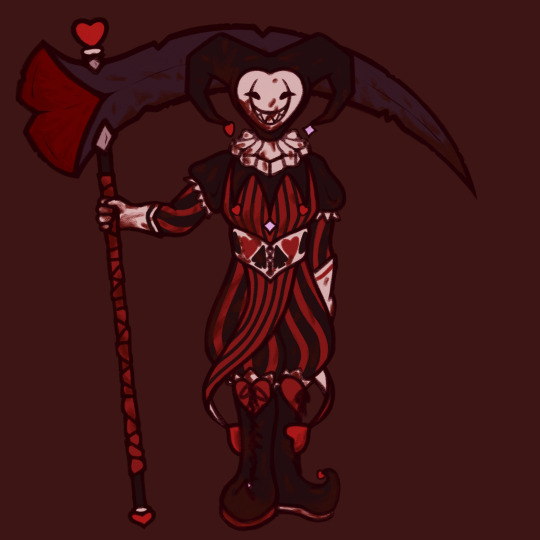
first finished piece of lifesteal fanart yaayyy!! I. I started this during the second round of the mcytblr sexyman contest. Why does art take me so long. I finished most of it a while ago but the scythe just took forever because I couldn’t figure it out and kept redoing it. I think it turned out good though!
#clownpierce#mcyt#lifesteal smp#lifesteal#btw I am Ssoooo normal about lives being represented with red hearts and white stars. <- is not normal and is constantly thinking about#undertale and deltarune. I am the opposite of normal I see my little video games everywhere.#also I actually finished this a day or two ago I just couldn’t figure out what to caption it. Me when the Issues#Oh wait. Uhhh. Should I tag for blood. Probably#cw blood#That’s probably good. I’m sure it’s fine#actually technically I drew this for someone bc they voted clown in the polls. But I said Id draw anyone and they said to just draw whoever#I wanted and so I just picked a sketch id doodled a while ago. And now it’s been a while since the event. And they didn’t really even#request this piece so I’d feel weird tagging them. I’ll still send it to them tho but like I’d feel weird mentioning it in the body of the#post Since while this was technically a request it was really mostly a thing for me that someone else gave me an excuse to draw#also no ID this time I’m having a certified Written Language Learning Disorder-Austin crossover event combo attack#so I am doing these sentences ok but description sentances will Not go well probably. If someone else writes an ID I’ll credit you and add#it to the original post. Honestly even if someone writes like the script for an ID o the start of one I’d be able to elaborate on it I just#can’t start one and do it entirely myself right now#chara makes things
53 notes
·
View notes
Text
The biggest male privilege I have so far encountered is going to the doctor.
I lived as a woman for 35 years. I have a lifetime of chronic health issues including chronic pain, chronic fatigue, respiratory issues, and neurodivergence (autistic + ADHD). There's so much wrong with my body and brain that I have never dared to make a single list of it to show a doctor because I was so sure I would be sent directly to a psychologist specializing in hypochondria (sorry, "anxiety") without getting a single test done.
And I was right. Anytime I ever tried to bring up even one of my health issues, every doctor's initial reaction was, at best, to look at me with doubt. A raised eyebrow. A seemingly casual, offhand question about whether I'd ever been diagnosed with an anxiety disorder. Even female doctors!
We're not talking about super rare symptoms here either. Joint pain. Chronic joint pain since I was about 19 years old. Back pain. Trouble breathing. Allergy-like reactions to things that aren't typically allergens. Headaches. Brain fog. Severe insomnia. Sensitivity to cold and heat.
There's a lot more going on than that, but those were the things I thought I might be able to at least get some acknowledgement of. Some tests, at least. But 90% of the time I was told to go home, rest, take a few days off work, take some benzos (which they'd throw at me without hesitation), just chill out a bit, you'll be fine. Anxiety can cause all kinds of odd symptoms.
Anyone female-presenting reading this is surely nodding along. Yup, that's just how doctors are.
Except...
I started transitioning about 2.5 years ago. At this point I have a beard, male pattern baldness, a deep voice, and a flat chest. All of my doctors know that I'm trans because I still haven't managed to get all the paperwork legally changed, but when they look at me, even if they knew me as female at first, they see a man.
I knew men didn't face the same hurdles when it came to health care, but I had no idea it was this different.
The last time I saw my GP (a man, fairly young, 30s or so), I mentioned chronic pain, and he was concerned to see that it wasn't represented in my file. Previous doctors hadn't even bothered to write it down. He pushed his next appointment back to spend nearly an hour with me going through my entire body while I described every type of chronic pain I had, how long I'd had it, what causes I was aware of. He asked me if I had any theories as to why I had so much pain and looked at me with concerned expectation, hoping I might have a starting point for him. He immediately drew up referrals for pain specialists (a profession I didn't even know existed till that moment) and physical therapy. He said depending on how it goes, he may need to help me get on some degree of disability assistance from the government, since I obviously shouldn't be trying to work full-time under these circumstances.
Never a glimmer of doubt in his eye. Never did he so much as mention the word "anxiety".
There's also my psychiatrist. He diagnosed me with ADHD last year (meeting me as a man from the start, though he knew I was trans). He never doubted my symptoms or medical history. He also took my pain and sleep issues seriously from the start and has been trying to help me find medications to help both those things while I go through the long process of seeing other specialists. I've had bad reactions to almost everything I've tried, because that's what always happens. Sometimes it seems like I'm allergic to the whole world.
And then, just a few days ago, the most shocking thing happened. I'd been wondering for a while if I might have a mast cell condition like MCAS, having read a lot of informative posts by @thebibliosphere which sounded a little too relatable. Another friend suggested it might explain some of my problems, so I decided to mention it to the psychiatrist, fully prepared to laugh it off. Yeah, a friend thinks I might have it, I'm not convinced though.
His response? That's an interesting theory. It would be difficult to test for especially in this country, but that's no reason not to try treatments and see if they are helpful. He adjusted his medication recommendations immediately based on this suggestion. He's researching an elimination diet to diagnose my food sensitivities.
I casually mentioned MCAS, something routinely dismissed by doctors with female patients, and he instantly took the possibility seriously.
That's it. I've reached peak male privilege. There is nothing else that could happen that could be more insane than that.
I literally keep having to hold myself back from apologizing or hedging or trying to frame my theories as someone else's idea lest I be dismissed as a hypochondriac. I told the doctor I'd like to make a big list of every health issue I have, diagnosed and undiagnosed, every theory I've been given or come up with myself, and every medication I've tried and my reactions to it - something I've never done because I knew for a fact no doctor would take me seriously if they saw such a list all at once. He said it was a good idea and could be very helpful.
Female-presenting people are of course not going to be surprised by any of this, but in my experience, male-presenting people often are. When you've never had a doctor scoff at you, laugh at you, literally say "I won't consider that possibility until you've been cleared by a psychologist" for the most mundane of health problems, it might be hard to imagine just how demoralizing it is. How scary it becomes going to the doctor. How you can internalize the idea that you're just imagining things, making a big deal out of nothing.
Now that I'm visibly a man, all of my doctors are suddenly very concerned about the fact that I've been simply living like this for nearly four decades with no help. And I know how many women will have to go their whole lives never getting that help simply because of sexism in the medical field.
If you know a doctor, show them this story. Even if they are female. Even if they consider themselves leftists and feminists and allies. Ask them to really, truly, deep down, consider whether they really treat their male and female patients the same. Suggest that the next time they hear a valid complaint from a male patient, imagine they were a woman and consider whether you'd take it seriously. The next time they hear a frivolous-sounding complaint from a female patient, imagine they were a man and consider whether it would sound more credible.
It's hard to unlearn these biases. But it simply has to be done. I've lived both sides of this issue. And every doctor insists they treat their male and female patients the same. But some of the doctors astonished that I didn't get better care in the past are the same doctors who dismissed me before.
I'm glad I'm getting the care I need, even if it is several decades late. And I'm angry that it took so long. And I'm furious that most female-presenting people will never have this chance.
15K notes
·
View notes
Text
thinking about how I've seen OCD get talked about now, but haven't really seen many posts that actually explain what it is. And like, obviously people shouldn't get all their info about mental conditions from posts, but u can't deny that internet communities and stuff play a major role in people recognizing and putting names to their own experiences.
But like since the general public has like absolutely no idea of what OCD actually is (no thanks to popular media), and a lot of things I see talking about intrusive thoughts don't mention OCD (either bc they originated in OCD circles or bc intrusive thoughts aren't Exclusive to OCD or for some other reason), there should prob be more explanation put out on what OCD actually consists of.
Which is kinda hard in some ways, bc there are so many ways OCD can present in terms of what "themes" a person experiences, so someone talking about what their themes are might not ring a bell with someone who experiences different ones. But like, the core thing with OCD isn't the presence of certain themes, it's a specific pattern of spiraling thoughts and reactions.
Like. OCD is a mental condition/illness where people experience stressful, unwanted, repetitive thoughts. These are intrusive thoughts are what make up the "obsessions" part of the disorder. In response to these intrusive thoughts, a lot of people will perform certain actions or think certain things in an attempt to neutralize or disprove the threat they represent. These are the "compulsions" part of the condition.
For a more "traditional" example, someone experiencing intrusive thoughts that they might catch a communicable disease may obsessively wash their hands or google their symptoms to try to lessen the anxiety. While someone who is worried they might hurt someone (even though they very much do not want to hurt someone) may avoid being near sharp objects or may avoid the people they're afraid of hurting.
One of the issues with OCD is that performing the compulsions provides short term relief, but in the long term it only strengthens the stress caused by the intrusive thoughts, thus furthering the thought spiral and actively making it worse, to the point where, depending on your themes, you may be (almost) convinced that your intrusive thoughts represent the truth or the inevitable or something permanent.
Intrusive thought themes cam be literally anything, but some of the common ones are stuff like
Questioning your sexuality, gender, etc (what if I'm actually straight/gay/bi/trans/cis/etc?)
Being worried about losing control and hurting yourself or others physically, sexually, emotionally, basically any way (what if I want to kill someone? What if I'm a pedophile? What if I'm an abuser? What if I want to stab myself? Etc)
Fear of becoming or being sick
Worrying something bad will happen to you or people you care about
Worrying about your spiritual beliefs or lack thereof (what if I'm actually Christian? What if I'm actually atheist? What if i don't believe in the faith i ascribe to? Etc)
Worrying about relationship status (what if I don't actually love them? What if they're not "the one"? What if they're cheating? What if *I'm* cheating? Etc)
What if I'm a bad person?
Fear of losing things
Fear of things not feeling right (this is often be related to other themes via magical thinking. ex: if I don't have my things organized Just Right then something bad will happen)
Fear of unreality
Compulsions vary by theme a lot obviously, but some common ones include
Hand washing
Organizing things until they Feel Right
Checking and double checking and triple checking to make sure you did something correctly
Obsessively reviewing your memories to disprove a thoughtor make sure you don't believe something
Arguing against the thoughts in an attempt to disprove them
Testing your mental reactions to a thought or to certain kinds of content, to show yourself you don't actually believe or feel something
Obsessively googling symptoms, testimonies, things related to your thoughts
Obsessive prayer
Repeating phrases, mantras, affirmations, etc in an attempt to make thoughts go away
Avoiding things and situations that set off your intrusive thoughts
Repeatedly asking for reassurance from others ("I'm not being xyz, right?")
But yeah this obviously isn't exhaustive but, just, if this kind of thing sounds familiar, you should probably do some research on OCD, bc while intrusive thoughts can occur with other conditions, the intrusive thought-compulsion spiral is the core of OCD and isn't really a subaspect of depression/anxiety/ptsd/etc. and the treatment and management of OCD can look different from other stuff, so its a good thing to look into.
(Also it's important to keep in mind, esp if you're someone that doesn't have it, that someone's intrusive thoughts Are Not "secret desires" or "repressed urges" or anything the person even remotely wants to act on. Someone having harm-related intrusive thoughts is not at risk of actually acting on them, no matter how worried they are of doing so.)
Anyway this was a long post and I don't have a neat way to wrap it up and also I accidentally added a poll and now can't get rid of it so here's free poll. I'm running on nyquil and a small amount of straight gin (which works very well at numbing a sore throat) rn gnite
#ocd#actuallyocd#actually ocd#intrusive thoughts#my hand is fuckin stiff from typing this all out on my phone rip
9K notes
·
View notes
Text
Facial Differences that You Should Consider Representing in Your Writing More
[large text: Facial Differences that You Should Consider Representing in Your Writing More]
As it has been said many times on this blog before, facial differences are a very wide spectrum - there’s thousands of conditions that cause it, and they’re often extremely different from each other! It’s an incredibly diverse category almost by definition. But…
In books, movies, and our inbox, it seems that a traumatic battle scar is the only facial difference that exists. I find this rather frustrating because I would like to see the real life diversity to be actually considered by writers when creating characters - and that’s exactly what this post is for. I hope that by making people just aware of the myriad of options they have, I can help a bit.
This isn’t to say that you shouldn’t write characters with scars, it’s to say that there’s more for you to consider. Just like not every physically disabled person has hip dysplasia and not every neurodivergent person has epilepsy, not every person with a facial difference has scars!
Of course, this list isn’t exhaustive - no such list exists, it would be like “list of every disability ever”, it simply can’t be done. This is just a dozen random facial differences that I would like to see incorporated into characters more often!
Facial paralysis
Exactly what the name implies. There are many types of facial paralysis - complete, partial, bilateral, unilateral, chronic, acute, and it can affect the whole face, or only part of it. Sometimes it can cause problems with speech or dry eyes (mostly the latter), but it’s frequently just primarily a visual difference. A person with facial paralysis might be completely unable to make facial expressions at all if it’s severe, or have a lop-sided smile and inability to raise an eyebrow or control an eyelid like me.
Causes include cranial nerve damage (especially the 7th nerve, which is called facial palsy), Bell’s palsy, Möbius syndrome, or multiple sclerosis! It can be congenital, like in my case, or acquired, like in most cases - mostly due to stroke.
Here I would write something about the current media representation being good, bad, or what tropes to look out for but I don’t know a single character with it. So :-)
Anotia/microtia
Microtia is a congenital facial difference that affects the outer ear(s) - as the name implies, they’re smaller than average; anotia means a complete lack of them. This usually will also result in being d/Deaf or hard of hearing in that ear, as the ear canal can be smaller or closed (depending on the “grade”). People with microtia who decide on using hearing aids will usually wear a bone-anchored hearing aid, which looks very differently from the “regular” HA; it’s worn with a headband.
Microtia can be the only facial difference that a person has, but it can also be a part of Goldenhar syndrome, Treacher Collins syndrome (mentioned below!), or hemifacial microsomia.
Congenital Trochlear Nerve palsy
I have a subtype of this, and because it happens to have the most boring name in existence I have never seen anyone talk about it, certainly not see a character with it. So!
CNIV palsy (again, an incredibly catchy name) is a disorder of one of the very-easy-to-damage nerves that allow eyes to move. It causes constant double vision, severe strabismus, and progressive facial asymmetry. A person with CNIV palsy will have a 24/7 head tilt to the side and will have their chin tucked in, which causes said asymmetry - facial features on the side of the tilt will sag down, the eye will “sunk” in, and because it’s congenital, the jaw can grow to be misaligned (like mine!). Over time, it causes neck pain and kyphosis, so add chronic pain to that.
Trochlear nerve palsy can be congenital, acquired, traumatic, and even extremely rarely genetic (that’s me! allegedly <1 in a million). However, most acquired cases are only temporary, and “fix themselves” with the passage of time.
Again, I would love to write something about CNIV palsy representation, but I’m fairy confident it doesn’t exist : )
Sturge-Weber syndrome
The most visible part of SWS - that you might be familiar with - are port wine stains! In this syndrome, they tend to be large and generally cover the forehead-eye area. Around 15% of people with any kind of port wine stain on their face have Sturge-Weber syndrome, and even more when it comes to larger ones.
Most people with SWS will have epilepsy since childhood, and many will develop glaucoma (which causes blindness) if the PWS is around that eye. Hemiparesis (one-sided weakness) can also sometimes happen on the opposite side of the PWS.
Here is a short article about media representation from a person with SWS!
Cystic Hygroma
Also known as lymphangioma, it is a bump that mostly happens on a person’s lower face and/or neck. It’s almost always congenital and a result of a blockage in the lymphatic system (thus lymphangioma). Sometimes, if it affects the mouth or jaw, it may cause a speech disability where the person’s speech might not be fully understandable, or cause an airway obstruction; this generally means that the person has to have a trach tube in their neck to breathe.
Here is a short article about living and growing up with cystic hygroma by Atholl Mills!
Congenital melanocytic nevus
A complicated name for a specific kind of birthmark! Melanocytic means related to melanin, so it’s a black or brown birthmark that can show up on any part of the body and be of almost any size. Sometimes it can be hairy as well.
While CMN doesn’t usually cause any problems, people who have it have a higher risk of skin cancer, epilepsy, and brain tumors.
Here is a short article on representation - among other things - by a person with CMN!
Ptosis
Ptosis is actually really common - I can almost guarantee that you have seen someone with it - but for some reason it never shows up in media, unless it’s to show that a character is under the influence or vaguely creepy. Ptosis is simply a drooped eyelid.
It’s caused by damage to the third cranial nerve, which can be congenital, acquired, traumatic, etc. It’s very common in myasthenia gravis and CHARGE syndrome. In most cases ptosis is a visual thing, but it can sometimes cause problems - for me, it partially obstructs my vision and for some people who acquired it later in life that can cause pain (due to having to constantly lift the eyebrow).
Ptosis is often misunderstood, and people tend to make bizarre assumptions about those of us who have it - even Wikipedia cites “looking sinister” as a symptom (not that I particularly trust Wikipedia as a source, but it shows the general public’s view quite well). In real life, we are normal people and all these “drunk/high/rude/evil” associations aren’t true at all.
Treacher Collins syndrome
You have probably seen a person with TCS at some point, as it’s not that rare. This is a genetic, congenital disability that affects the development of the face.
The bones of the jaw and cheeks are underdeveloped, eyes have a downturned shape, and microtia/anotia is often present as well. A lot of people with Treacher Collins are d/Deaf or hard of hearing. Sometimes, the small jaw might cause problems with breathing, which is why a lot of people with TCS will have a permanent tracheostomy tube in their neck.
Similar to ptosis, eyes in TCS are often seen as “looking sad”, but that’s an incorrect assumption - that’s just how they look like.
The main and only big representation of TCS in media is that one awful movie from a few years ago, that was literally just inspiration porn featuring an able-bodied actor based on a shitty book, made by an author with some sort of abled-person guilt. Very cool, don’t do that.
Crouzon syndrome
Crouzon syndrome is a type of craniosynostosis; a congenital condition where a person’s skull fuses too early. There are other disabilities that can look somewhat similar, like Pfeiffer or Apert syndrome, but they are different!
CS will affect the person's skull - it will be taller than usual, eyes - they will be large and bulging, midface - it's often smaller than average and can look sunk in comparison to the jaw and forehead, and more! Sometimes people with Crouzon syndrome are d/Deaf or hard of hearing (very common with craniofacial differences), or experience long term effects of hydrocephalus, which happens fairly often.
Here is a short article by Mikaela Moody about movie representation - and her piece on how it to be trans while having a facial difference, which I relate to a lot and wanted to share:-)
Phthisis bulbi
Phthisis bulbi is something that I have mentioned on this blog before, as it logistically should be represented way more often in fiction than it currently is. It's also known as the “end-stage eye” which is a pretty metal name. This is an ocular difference that can result after trauma to the eye. It can also result from a million other things, but trauma is apparently the most common thing to happen to an eye in fiction, so.
With phthisis bulbi, the eye shrinks, sinks, and everything inside becomes stiff; this is permanent, and the eye isn't functional anymore - it's blind and unable to move. The only treatment is to have the eye removed, especially if it causes pain.
If you're writing a character who got a Hot Sexy Scar over their eye and still has that eye, they probably should have this (and yes, the “shrunk and sunk” part is mandatory, you can't just make the eye lighter and call it a day).
Frontonasal dysplasia
Frontonasal dysplasia is a congenital facial difference that affects the structure of the face. While it's a spectrum with a lot of variety, most people with FND will have hypertelorism (eyes spread widely apart), a flat and broad nose, and a cleft going through the middle of the nose. Other facial clefts (not necessarily just cleft lip) are also common. Sometimes, someone with it can also have cranium bifidum (meaning a brain/meninges that protrude through the skull, similar to how spina bifida works), or intellectual disability related to the potential absence of corpus callosum. Rarely, limb differences can also be a part of it; absent tibia, extra toes, or clubfoot.
Again, I’m unaware of any representation of FND outside of “scary birth deformity” on medical shows :--)
Parry–Romberg syndrome
PRS is also known as progressive hemifacial atrophy, which is a much more descriptive name. It’s an acquired facial difference that people just get for unknown reasons, mostly before the age of 20 and usually between 5 and 15. Generally, PRS is considered to be slowly-progressing, but this can vary pretty widely between different people.
As the name implies, it causes atrophy in the face, which affects everything from skin to fat and muscles to sometimes even bones. Some people will also experience skin darkening, alopecia (hair loss), or trigeminal neuralgia (very severe nerve pain) on the atrophied side. The difference between the two sides can be very pronounced, with a visible line between the halves showing up on the forehead.
Again, no existing rep that I know of :-)
And as always, I recommend this short PDF that in my opinion any writer who wants to include a character with an FD has to read. Additionally, you can also check our #face difference tag, this primer on facial difference, or this piece on making sure you’re not contributing to disfiguremisia.
Also apologies for the amount of “idk what to say about already existing rep because it literally doesn’t exist afaik” but I hope it illustrates the problem :-)
Happy Face Equality Week!
mod Sasza
#mod sasza#face difference#disabled character ideas#writing guide#writing resources#writing advice#writing help#face equality week#long post
725 notes
·
View notes
Text
mini astrology observations 1/???

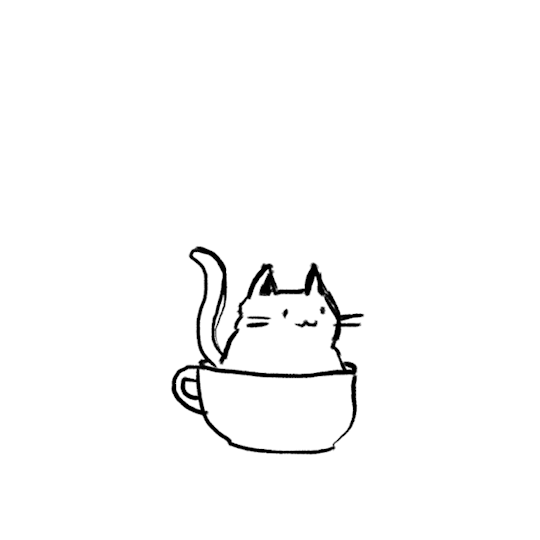

hi hi ! these are my first (and probably last) astrology observations. i expect that you might not agree with any of these so i am open to criticism. i also want to point out, that i am not a professional. have fun reading <3
p.s. - the art belongs to kibong rhee/이기봉
...
☆ pisces/12th house placements 🫱🏻🫲🏽being tired/sleepy all the damn time for no reason
☆ your house/sign stelliums might refer to the part of your body you should focus on when considering fashion. for instance: people with pisces/12th house placements might really like shoes, person with aries/1st house placement can look great with anything related to head (glasses,ribbons,hats etc.), taurus/2nd house people might look great with necklaces or any jewelry...
☆ i don’t know why, but I always get attracted to men whose mars trines mine venus…like four men that i found to be amazing, had all mars in the same element as my venus. the aspects weren’t mostly even that tight, yet i felt something!? of course this might not apply to you (because you should consider everything else in natal charts, synastry chart etc.), but men are represented as mars and women as venus after all…try to check this next time you like someone or if you are with somebody.
☆ people who have 3rd house or 5th house placements that are negatively aspected might have problem with presenting (even the ideas) or social anxiety disorder. both houses are related to youth so it may have showed in their early years. this will most likely be seen/felt if the aspects are present in between these two houses (for instance square).
☆ this is very random, but your mothers moon might be in the same sign as your descendant.
☆ scorpio placements (especially moon, mercury and mars) are so hard to deal with and not just for the person who has them, but also for everybody else around. for instance: my mom and sister both have these and i can’t argue with them as i always loose and come out as the “bad one”. these placements always stand up for their opinions and might say something harsh without really meaning to. they also might try to find excuses/backup for something to avoid being hurt (in conversations as well). deep inside they are very fragile…this might apply to aries placements as well.
☆ why are virgo mars men always thinking about “that thing” (aka. are h*rny). even when something innocent was said, they connect it with doing “it”. double points to those, who have mars in their 10th house.
☆ if the houses in the synastry are overlapping each other so that the 1st house overlaps with 1st, 2nd or 12th house (if the ascendants are close to each other), people with this synastry have bigger probability to complement/understand each other really well. that is because one persons placements may fall into the house that is same to their placement in natal chart or the natal chart of the other person. these people are at home with each other and probably went through the same life experiences, therefore they don’t need to be afraid to be judged. they just get each other. this is literally a soulmate connection. what i mean:
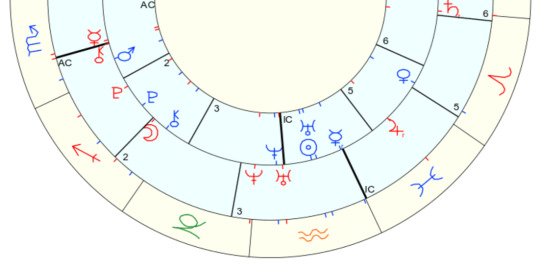
→ if you look at the neptune you can see, that they fall into the same houses. same goes for pluto etc.
☆ venus is what you like and what you want and therefore, it can represent your ideal partner and what you are looking for in them. this applies to both women and men.
...
okay, that is all. feel free to leave your feedback :)
edit: just checked this post and i don't know what to think...thank you all so much for such a reaction, i appreciate it a lot :D love you <3
#zodiac#astrology#astrology observations#astro observations#astrology notes#astro notes#natal chart#natal chart observations#synastry chart#synastry chart observations#astrology community#synastry#synastry observations
614 notes
·
View notes
Text
Does Max give anyone else major twist villain vibes???
Okay I haven't talked about Max much yet, but I think it's kinda wild to see people talking about him like he's just this sweet innocent cinnamon roll when my read on his character was the COMPLETE opposite.
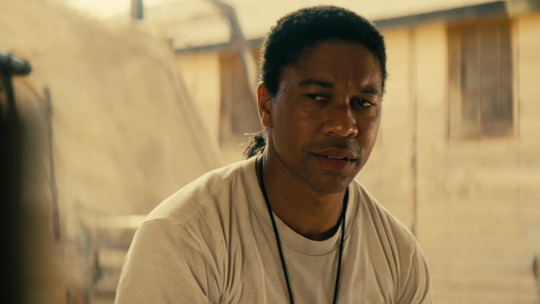
I mean yes, he does seem very sweet. He's very soft spoken. Naive in a way like Lucy, but not as much. Kinda vulnerable. Got a killer smile. And some of the moments with him and Lucy are super cute and adorable. But damn if he doesn't have a DARK side!
Like I've heard people say that Max is stupid or that Aaron Moten's acting is bad, but hell no. Aaron Moten sold me on his acting during the interrogation scene. Max was scared shitless and I FELT that. I think Max was meant to be played as a character who lacks understanding about certain things and seems disconnected from people due to both being brought up in basically a cult and having an inherent lack of empathy.
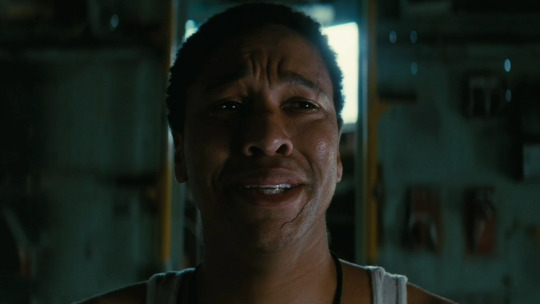
You think about the fact that he admitted he wanted Dane to get hurt, someone who's supposed to be his best friend. How he coldly sat there and watched Titus die. And before that stood there and watched him get mauled by a bear, almost like he was fascinated by it and wanted to see what was gonna happen. The fact that he tried to kill Thaddeus the moment he became a threat, even though the two of them had appeared to have bonded and developed a genuine friendship. And let's not forget he was willing to let all of Vault 4 get plunged into darkness just so he could keep playing with his power armor.
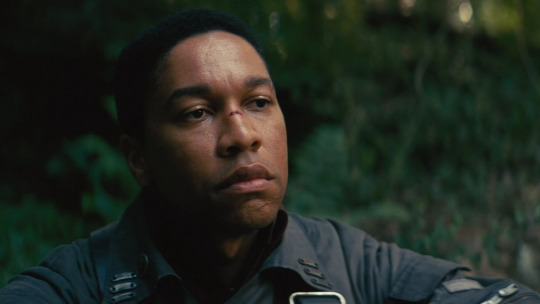
Max wants to be a knight, he wants to be a hero. And I think he tells himself he wants it for the right reasons, but I think what he REALLY wants is power and recognition. Which is really what every (okay maybe not every, but a lot) good villain wants, right? Because at the end of the day Max wants what Max wants. He's selfish, even though he doesn't think he is.
And sure, he's nice to Lucy. And he went balls to the wall to save her when he thought Vault 4 was gonna execute her. But she's a pretty girl who helped him and offered him a safe home. When she gave him the proposition that if she helped him bring back the head, he would have the Brotherhood lend her some knights to save her dad, he KNEW he couldn't make that promise. But he made the deal anyway. So he doesn't REALLY care about her or what she wants.
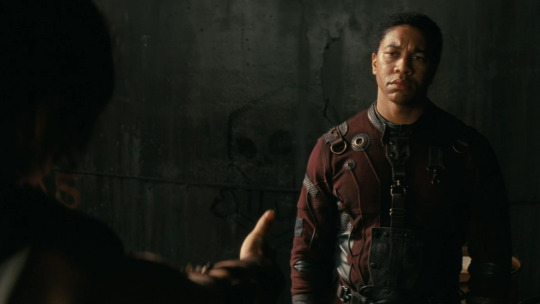
And that blank stare he gets when he gets mad? ACTUALLY terrifying. The guy's got serious psychopath vibes. Literal anti-social personality disorder, if you ask me. In fact the first thing I thought about when Max let Titus die is this kids going to end up going to the dark side lol.
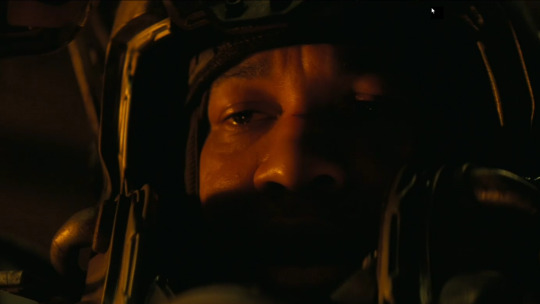
And I think that would work really well thematically if they plan on giving The Ghoul a redemption arc beside it. There are so many parallels between Lucy and The Ghoul, and they have such a strong connection to the beginning when the bombs dropped. I get that Max is there to represent the Brotherhood and he's from Shady Sands, the town Hank destroyed, but it felt weird that he didn't seem to be AS important in the grand scheme of things compared to Cooper and Lucy.
But if Max turned out to be a badass twist villain to thematically contrast Cooper's redemption arc, while Lucy remains steadfast to her commitment to goodness and the golden rule I feel like that would really round it out. It would make sense if you consider a lot of people have pointed out that Lucy, Cooper and Max all seem to represent different play styles and different moral alignments. And I think it'd be pretty crazy if the writers of the show set out to make it seem like Ghoul is a bad guy and Max is a good guy, but then it ended up being the opposite.
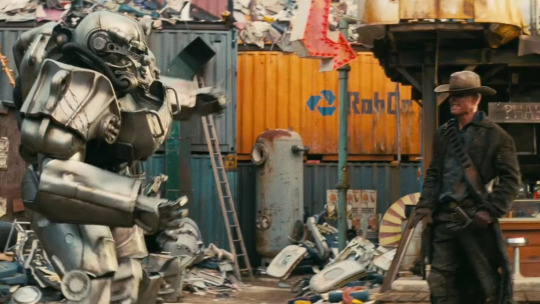
I mean, there are definitely hints all over the show that The Ghoul isn't as bad as he may seem. And Max has already done some pretty messed up stuff, so I'd say the possibility is totally there, and I'd be here for it!
Who's with me???
#seriously why is no one talking about this??#is no one else seeing what i'm seeing??#is it just me or am i crazy??#also Max really doesn't get enough love tbh#rooting for twist villain Max over here haha#maximus#fallout#maximus fallout#fallout maximus#cooper howard#lucy maclean#fallout prime#fallout tv series#fallout series#the ghoul#fallout show#aaron moten#my posts#meta#ghouly-boi
228 notes
·
View notes
Text
The man surrounded by the theme of love…
Geto.
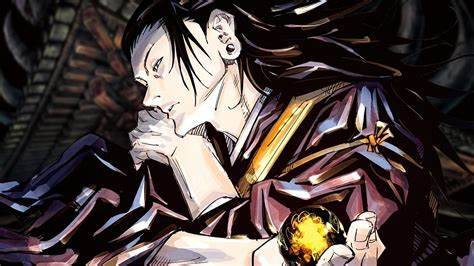
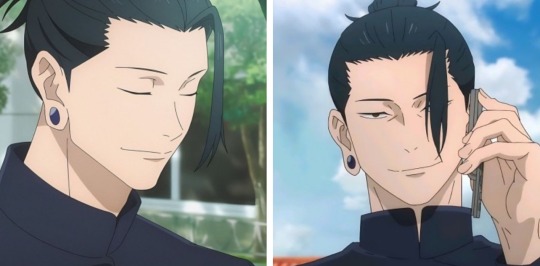
Gege has made several writing choices to depict Geto as someone who was handsome and loved - arguably more than any other character in the series. Maybe Gege loves him the most - not complaining at all.
More under the cut - just a few visuals I’ve collected to demonstrate this. I’m certainly not alone in noticing it and there may be others who show this much better, lol. Tag me in if you want to share!!
My post does end with a not-so brief analysis which you can skip if you wish.
Geto, despite being cursed at birth with the technique to absorb the ills of the world, the very skill that led him to fight alongside Gojo as part of the Strongest Duo - by design, each others’ counterpart in so many ways - a twist of fate led them onto opposite paths, leading to complete imbalance, one that drove him into madness.
If Geto in some ways represented Love, it is truly the most twisted curse of all which played a part in his death.
Geto witnessed the most love confessions in the whole series - I found (and stole) it off twitter/now X:
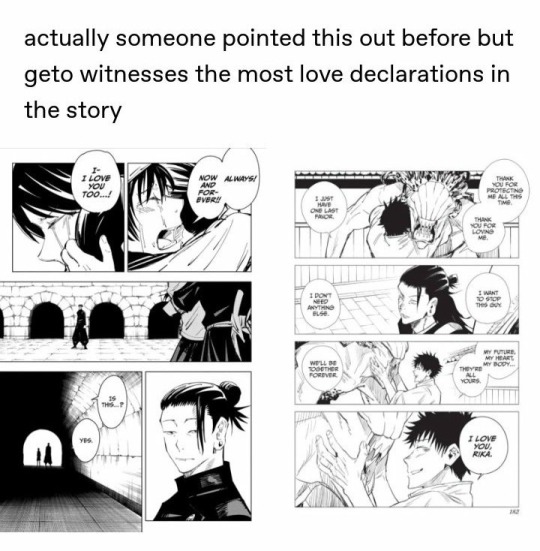
The Japanese originals seem more compelling to me:
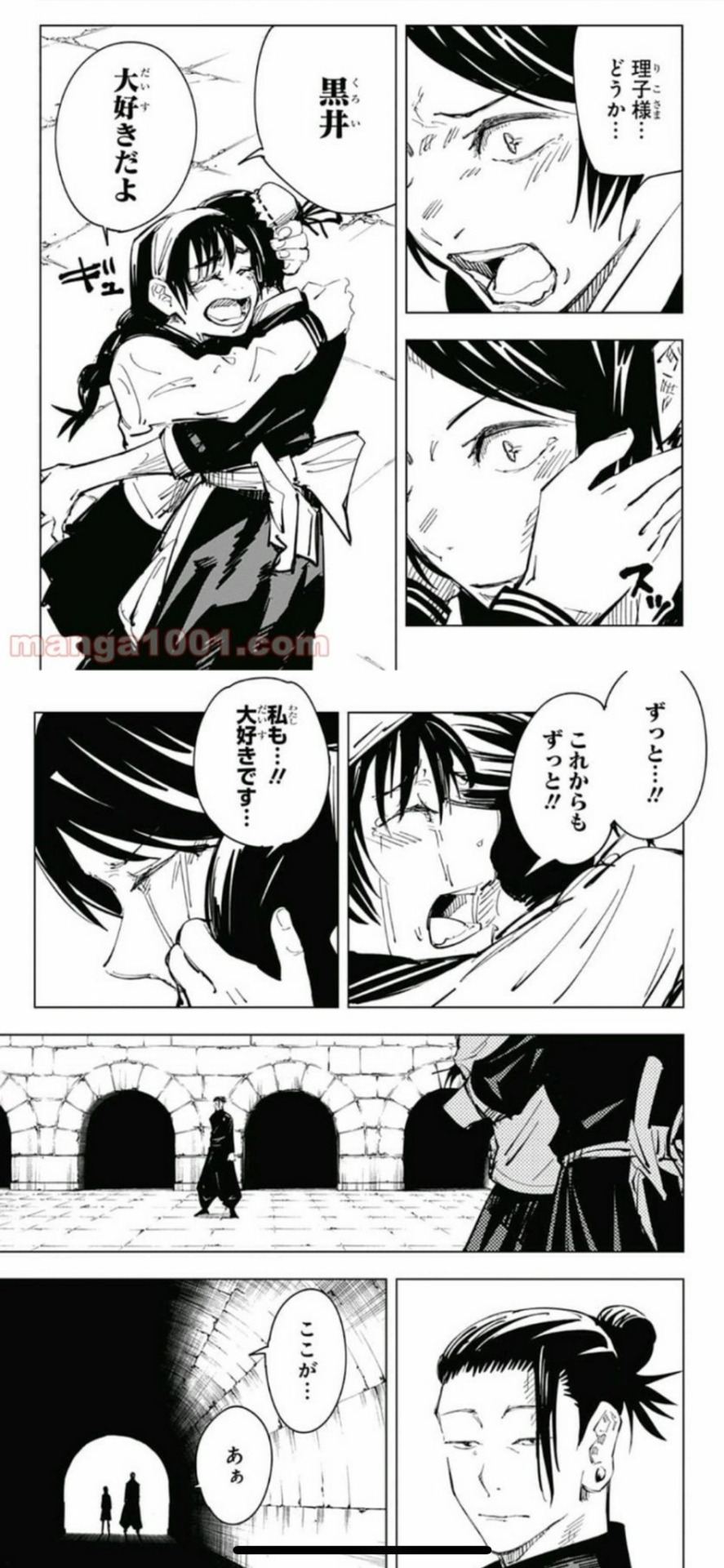
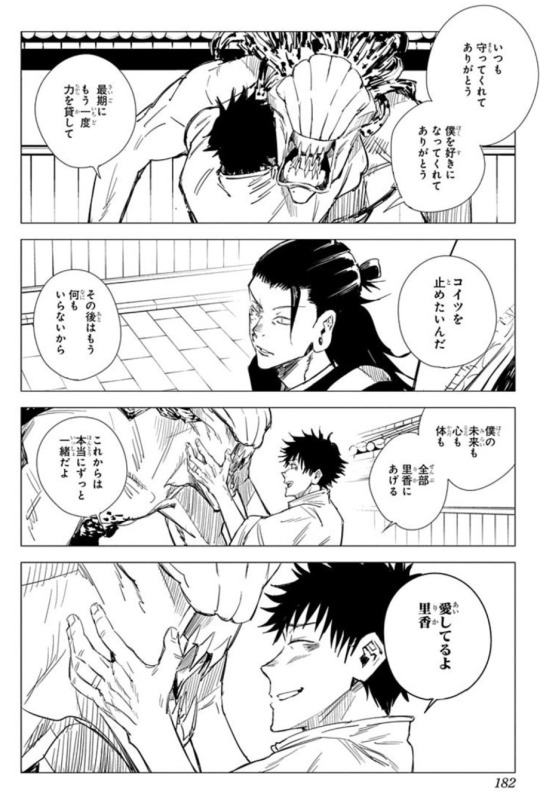
Riko says “daisuki” whereas Yuta uses a more traditional “Aishiteru” which, is quite embarrassing of a confession, and therefore almost hints at what could be Gojo’s last words to Geto, if it directly parallels Yuta & Rika’s relationship. And that expression Geto wears when he sees Riko and Kuroi struggle with separating?
That does not look like a person who cannot sympathise and empathise with people. Geto was a person who cared too much, and in search for a way to protect those he cared for, needed an outlet and something (in this case, lesser being, the humans) to blame. He descended into a mania and much like shinobu sensui from yu yu hakusho, seemed to develop some kind of mental disorder due to being unable to carry the conflicting ideals together. The dissonance the world presented to him was just too cruel, and he himself became a weapon to defend his ideals.
Before his defection, Geto was liked by his peers:
Haibara

Mei Mei
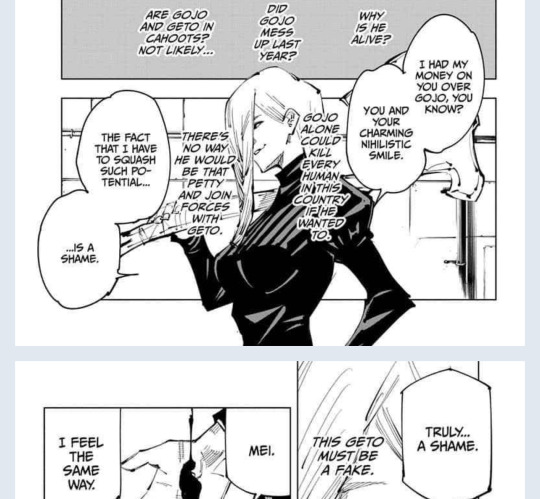
Loved by his family for and despite his ideals:
Mimiko and Nanako
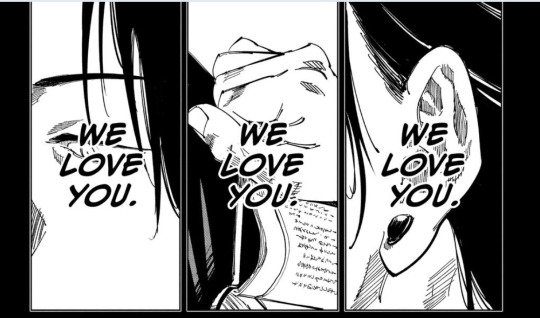
Shibuya crew liked/loved him and carried his will/beliefs even after his death, in their own ways, as family:
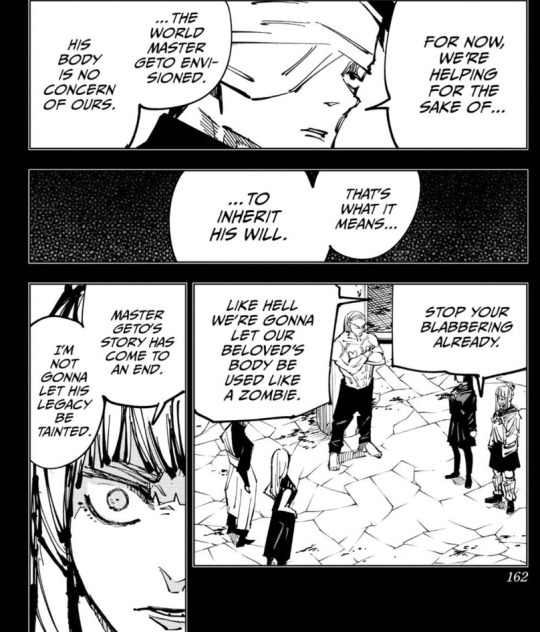
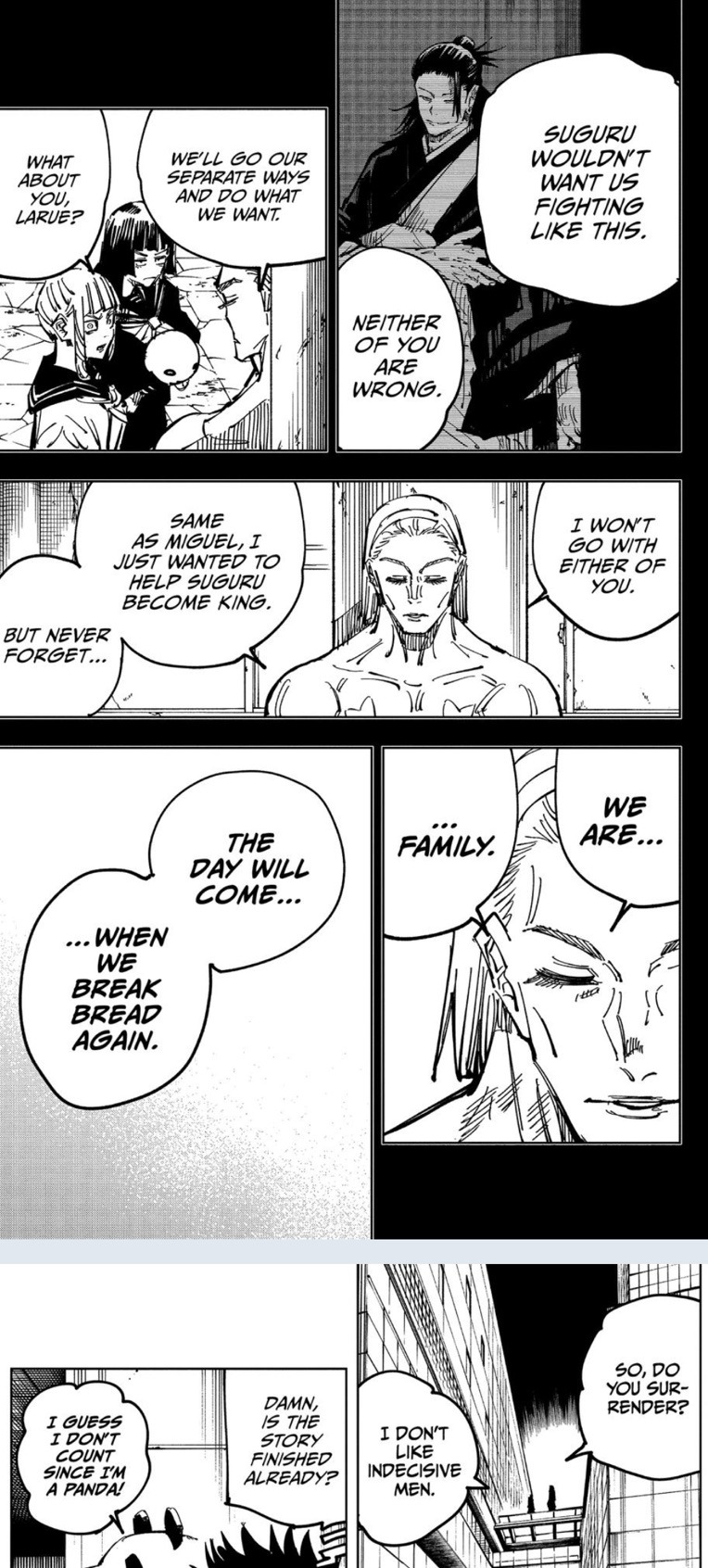
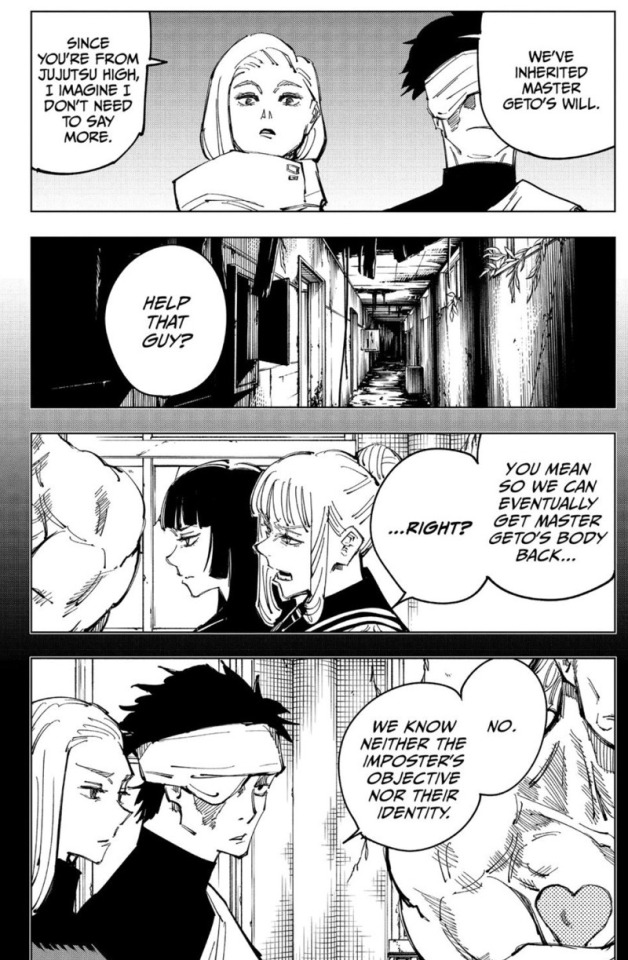
Miguel and Larue in the most recent chapter to date:
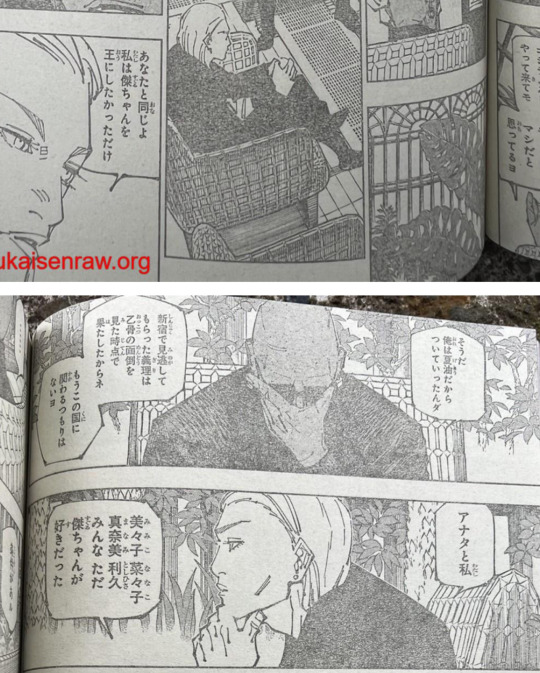
Translations (rough):
Larue: You and me alike, we just wanted Suguru-chan to be King.
Miguel: Yea, I followed just because it was Geto. After shibuya, I trained Okkotsu and I don’t want anything to do with the country anymore. (Something along these lines; a little too complicated for my rudimentary Japanese)
Larue: You , me, Mimiko, Nanako, Manami, Toshihisa, everyone just really liked/loved Suguru-chan.
Canonically, he was known to be handsome and popular:
Takaba
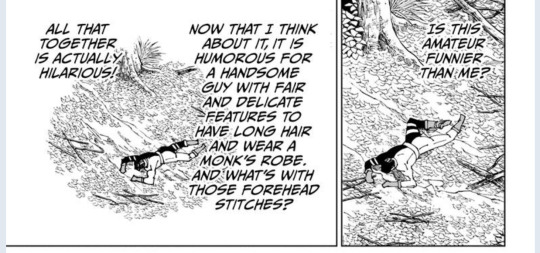
Gege’s character book:
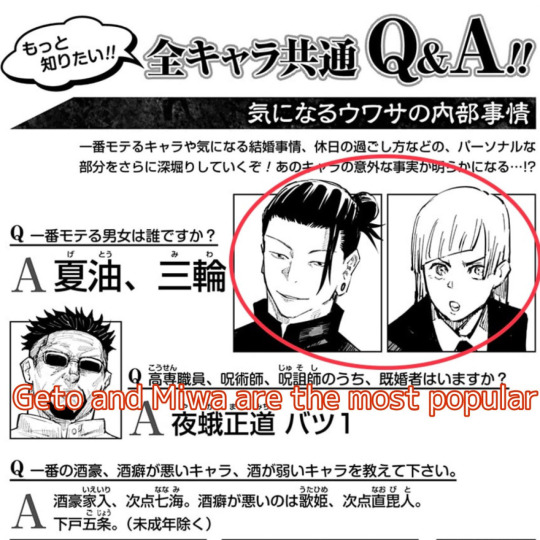
JJK popularity poll:
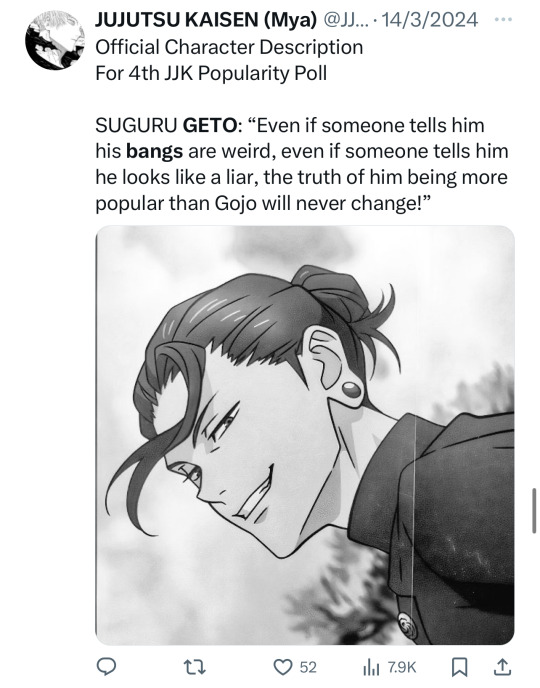
I do not have screengrabs of how Manami and Larue joined, but it was said to be due to how handsome they thought he was.
Maybe he was like Rika, who did realise how she came across in her life, and manipulated people, lol. But that’s a bit of a stretch to bring that parallel/similarity in. Geto was just quite a magnetic person, according to Gege.
And in the most roundabout way:
Gojo:
“my one and only”
“Love is the most twisted curse...” “curse me a little at the end.”

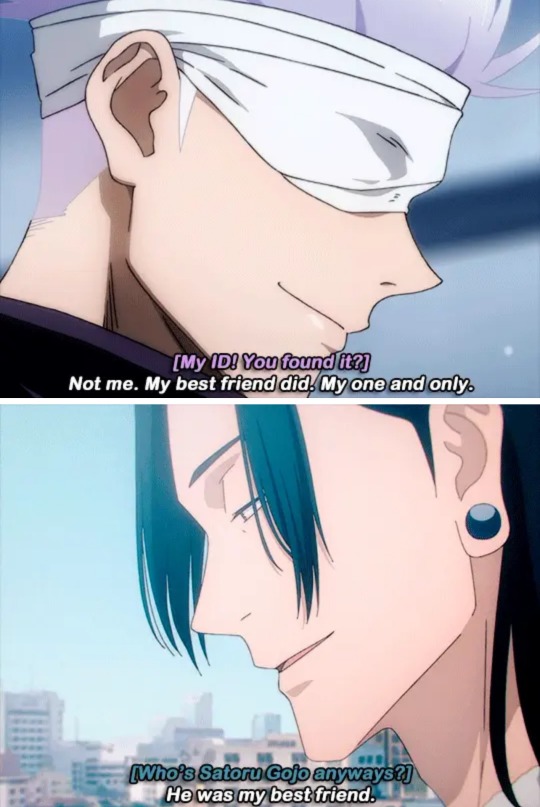
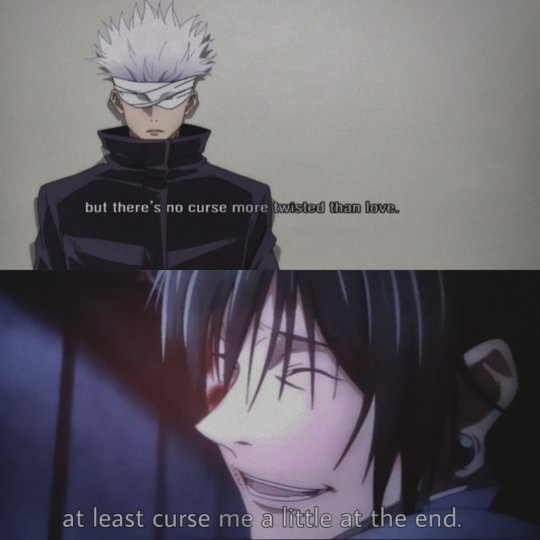
“I don’t need love to satisfy me” ... “if you were there I might’ve have been satisfied”
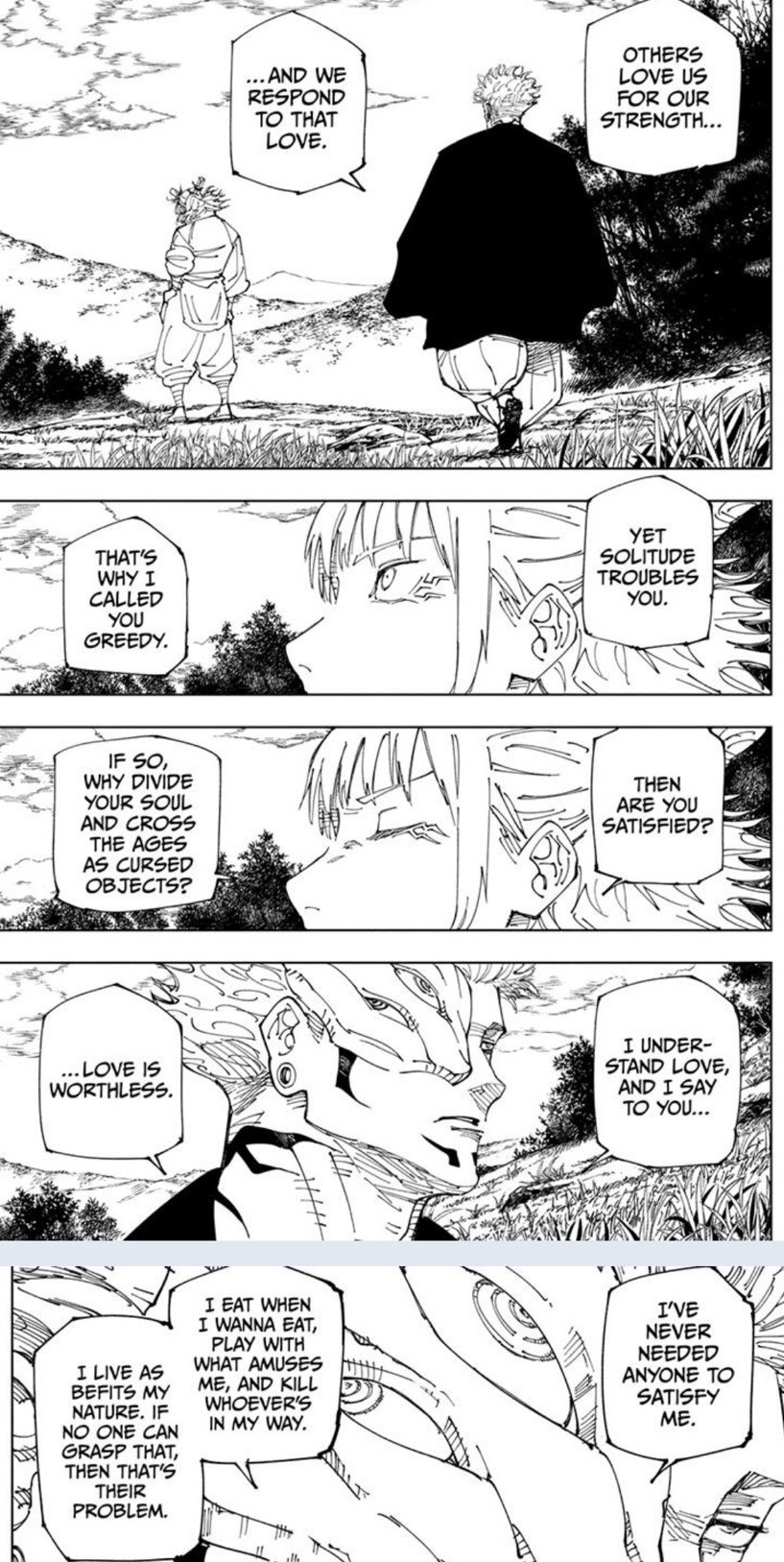
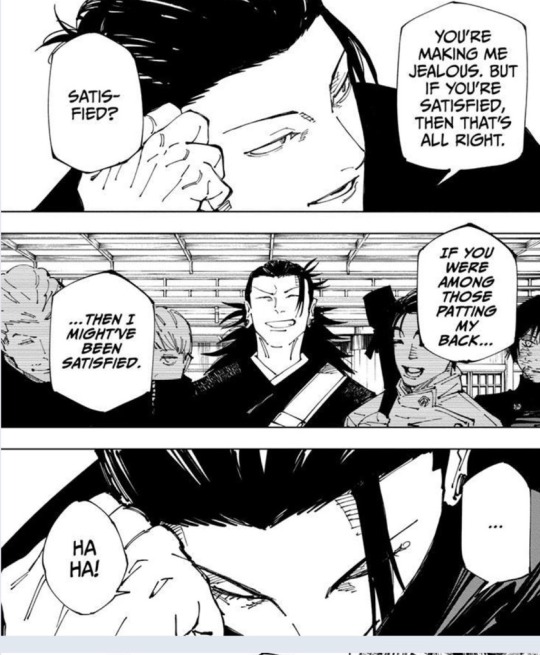
While love surrounds Geto, the theme that follows Gojo appears to be “the strongest” cursed; he was admired, revered, feared, and disliked by many. It truly breaks my heart, to think of what he had to give up to carry the weight of this for his whole life, until the very end.
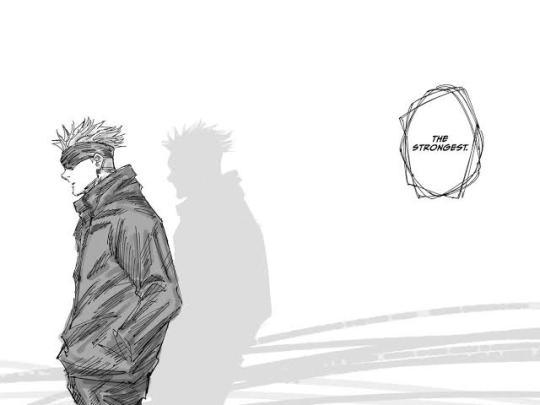
This looks like the most dizzyingly lonely picture of Gojo. It was indeed ironic to have it all but to embody what it means to have an unlimited void by being totally different.
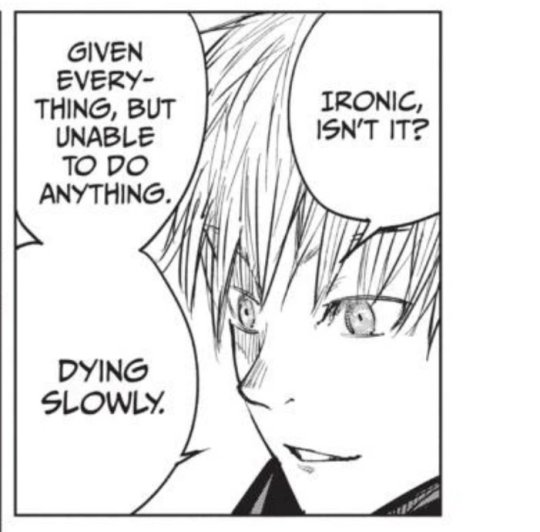
He suffered so much for his power and to have carried this strength. The sorcerer world was practically on his shoulders. The balance was up to him; everyone relied on him. Every time he tried to protect his love (geto) it seemed to fail. It worsened each time, ending with his own demise. But of course that’s just a dramatic interpretation - I don’t really mean/believe that, but it is one way to see the tragedy between Gojo and Geto. Strength at the expense of love; it plays out with the strongest this far as those identifying with this title are plagued by loneliness and do not know love.
They met before things got twisted within themselves, between them. Even after Geto left, Gojo seemed to be looking and waiting for him - to prove his trust for him almost as if he saw through his illusions and lies. Geto was the shadow (Yin) and Gojo was the light (Yang). Only the light can see through the dark. I’ll leave the gojo characterisation for another time / to other better writers.
For now, I’ll just say that I felt that he had planned for the possibility of losing to Sukuna (with the various things we see him do between scheduling the 24th and the actual day) and if he won, he’d just carry on the plan to cremate Geto on top of saving everyone and being a good example as the strongest. Worst case scenario, he would weaken Sukuna and I guess just die on the same day as Geto - idk, maybe as a form of redemption for one of his most painful experiences in life. Who knows?
I headcanon he was relieved to pass on, doing his part to defend the world that relied on him so much, with a big bang - a really fun fight.
And I’m glad they found each other at the end - the loved and the lost.
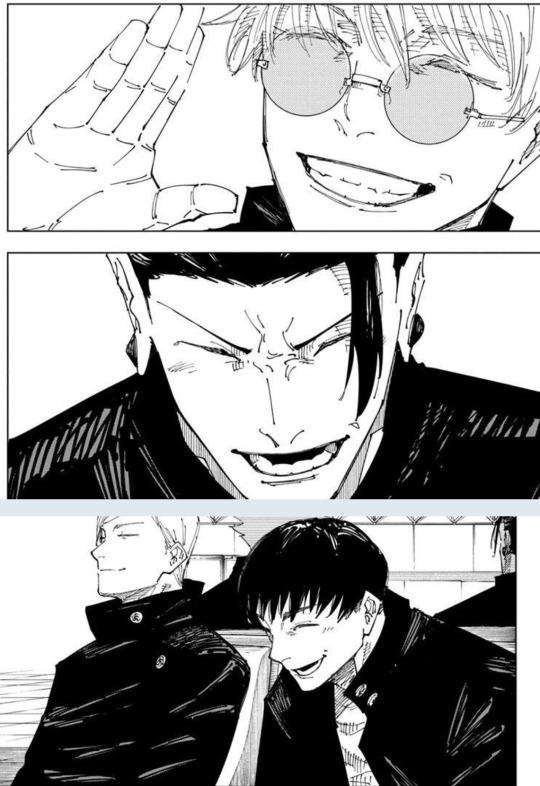
Back to Geto:
We don’t get much insight into what Geto wanted or felt aside from a world that was better for sorcerers, those he cared about. Even at the afterlife scene, or in subsequent chapters, we only hear from others rather than Geto.
Call me biased and delusional; I believe he didn’t kill the innocent despite saying he hated them all. He loved and hurt so strongly that he hated with almost equal force. He did want to force evolution and eventually extinguish all human kind, to him: the ignorant source of suffering, but I’m glad he didn’t manage to get Rika. I headcanon that he was aware he was losing himself by defying his own principles (to kill sorcerers) for his own gain. That, and Rika with a binding vow for a life, no less, was just too powerful.
In the official character book, Geto was described as someone who told himself that he hated humans a lot, like a reminder. He didn’t kill people indiscriminately. I’m sure he was well aware of how evil he had become but he had chosen, hadn’t he? He expressed to Yuta, that self-affirmation was incredibly important in his view. And the more he interacted with the students, I think the more his humanity fought back - I mean, he was standing there crying from being so moved by what he saw. He also let Yuta heal his friends. How villainous? Or how incredibly loving in spite of himself?
Geto has been shown to lie to others too: jjk 0: described having lied to the school about the conditions for obtaining a cursed spirit, and after defecting: upon taking stage for the first time, stating that the looking the part (wearing gojokesa) was important (ie lying). At his death’s door, he also prefaces with, no matter what anyone says - why would there be a need for that if he wasn’t telling a half-truth? He sought to avenge Riko (first person at the cult he killed after calling him onto the stage + cue mic throw) and the village represented a bunch of people who he slaughtered out of rage and ignorance. I’m definitely not defending him here - his actions are reprehensible. My headcanon view is that he didn’t know how to live with himself after snapping and that was the only path laid before him, which he ardently committed to.
I just think that he held onto a form of love/humanity still- Gojo and Geto both did. Without it, Geto would’ve become the Queen of curses due to Rika (uncaring about his family, or killing young sorcerors despite witnessing the students’ bond and yuta’s selfless power of love in jjk0) and Gojo may have focused on training at all cost without embracing Geto’s principles and becoming a teacher to change the jujutsu world - he could’ve become the next Sukuna and take the title of the King of curses instead - crowning them both King and Queen - instead of both the King and Queen contributing to their deaths. Anyway, I digress...
Geto appears very mother-coded in his protective and defensive relations to the girls, but also to Riko, Kuroi, and Gojo - especially after Toji had killed them. He was so fiercely trying to avenge and defend them, but failing that had a huge effect on him. Moreover, Haibara - innocent, glowingly positive - suffered an undeserved death. It weighed so heavily on Geto, that he didn’t defend Gojo when Nanami vented about leaving things to Gojo who seemed to take it all in his stride, almost insinuating that Geto, too, had little autonomy but to carry on that cycle of curse consumption he began to loathe.
Yuki also underlined the meaninglessness of the death / sacrifice / relationship rupture / suffering. And like the novel implies: Geto was too sincere for this world. He just loved too deeply and wounds cut him too painfully. At just 17... what inner resources were they forced to develop?
He was disillusioned by the system, but respected that Gojo had a place there. This is also SatoSugu indulgent: He never once attempted to talk Gojo into joining him, despite it being the most logical choice, but Geto was the emotional and loving kind - he prioritised Gojo over his ideals / himself. This man was willing to die trying to pursue his ideals, but didn’t want to try convincing his friend even if he know it might fail. What does that say about him? I think it says he loved Gojo. And Gojo loved him.
He masked like Gojo did : the infamous “yeah I’d win” and Geto’s “I’ve made my choice” and his face fell as he had his back turned, stating that he just needed to do it to the best of his ability. This may be headcanon but it does seem plausible to me. He was under no illusions about what he had done. To love was to turn away too. To love was to let the other go. Sigh.
Backtracking a bit: When Geto encountered the twin girls, who knows what entered his mind, but there was something that emerged from being horrified, enraged, and it gave birth to new meaning. He would take control and save them - from humans and the institution that made child sorcerors die. According to Gege, he became Papa Geto. (Kenjaku is also mum-coded but the antithesis of motherly love, with the womb protrusion domain and actually bearing children.)
This is of course not limited to feminine energy, as parents, both male and female, have protective instincts. But I’m not here to go into that discourse. Just stereotypically, and loosely speaking, Geto is very Yin energy. He is a big Mama Bear. With extreme maternal aggression. We see female counterparts do this in the wild more than males. And yes, of course both male and female are protective. Both geto and gojo were protective in their own unique ways. That’s for another post. Geto would rather die than have anyone come save him. In fact, the scripture behind him in the temple goes somewhere along the lines of “death to the weak”. If he had failed, he deserved to die. His family should live.
Gojo cares for others differently. And yes we know he died whilst defending others too. He is inherently more individualistic due to what he is with his gifts and noble heritage. He is less emotional and more cerebral, the only time we saw him lose his composure was due to Geto.
He allows his students to take risks and would allow them to fight in his stead, like in jjk 0 where Toge and panda were sent to be defeated by Geto. Tough love, as Gojo admits. This is also very Dad-like in the modern sense of the word.
In my subjective experiencing of the world, it’s almost like a husband who is only really emotionally vulnerable with his wife, and is otherwise the successful businessman, dad, and whatever else he is. Geto is much like a mum that he would walk away from her husband (lol, Gojo in this case) in order to protect them in a way she deems is best. Maybe I’m a little nuts, I don’t know. (Actually I am a little eccentric, but that’s by the by).
Now this is totally just satosugu indulgent: I headcanon that Gojo also “protected” / was possessive of Geto by making a deal with Miguel since the latter said he would curse Geto if he died, lol. Especially in light of the latest chapter where Miguel said he was spared by Gojo. (And i reckon Gojo was respectful of Miguel being Geto’s family, so he spared him for that reason too). I mean, Gojo had to kill his best friend, but this was his burden to bear, you know? It’s almost sickeningly intimate to allow someone to end your suffering, and be entrusted with that too. Ugh, ouch, my heart…..
Edit: I’m reminded of that scene where Shoko reflects on loving neither of them, like Gojo, Geto didn’t want anyone to be alone anymore either. Geto said he didn’t feel happy from the bottom of his heart. Gojo felt lonely (although he said it got better at the airport scene). They weren’t alone, but probably felt it… because of the absence of their true/first love? Larue stating in the panels above that Geto wouldn’t wish for them to fight seems like a nod to what Geto believed happened between him and Gojo. Gojo raised allies - be strong, don’t be left behind. Geto a family - get along, don’t fight. Just pointing out what my take is on the parallels I’ve observed.
That ends the brief analysis portion of what I wished to convey about what appears to surround Geto. He may not have been depicted much in the series, but his presence has been felt through the eyes of many. It made me wonder why did Gege do this?
This author deliberately wrote multiple people in the verse to love and follow him (and spare him a death sentence for 10 years) despite not agreeing to his ideals.
Perhaps it isn’t Gege’s focus, understandably, to give us a lot more insight from Geto’s pov, but there is certainly some kind of narrative he is pushing to depict how this man, cruel yet kind, is somehow one of the few he seems to portray in this way more than others within the sorcerer world at the very least. That his life was somehow a tragedy that he might not have really known the love at all? I wonder what Gojo’s last words were to incite such a heartfelt reaction - well done? Welcome home? You did well? I love you? My one and only best friend? Sigh, I guess it’s a secret between them.
There are others who have written metas on Gojo and maternal energy. If I find it I’ll link it! Otherwise, search through my reblogs! So many fantastic writers and thinkers out there!
Thanks for reading if you made it this far!
#satosugu#stsg#jjk analysis#jujutsu kaisen#jjk meta#jjk spoilers#geto suguru#jjk#gojo satoru#jjk satosugu#jjk theories#jujutsu kaisen meta#jujutsu kaisen geto suguru#jujutsu kaisen theories#gege akutami#geto meta#satosugu angst#suguru meta#jujutsu kaisen suguru#jujutsu kaisen geto#jjk miguel#jjk stsg#stsg angst#satosugu analysis#jjk character analysis#satosugu theories#jjk manga#jjk anime
340 notes
·
View notes
Text
Writing Mental Health With Compassion
I've gotten a few questions regarding depicting characters with mental health challenges and conditions and I wanted to expand a little more on how to depict these characters with compassion for the real communities represented by these characters.
A little about this guide: this is, as always, coming from a place of love and respect for the writing community and the groups affected by this topic at large. I'm also not coming at this from the outside, I have certain mental illnesses that affect my daily life. With that, I'll say that my perspective may be biased, and as with all writing advice, you should think critically about what is being told to you and how.
So let's get started!
Research
I'm sure we're all tired of hearing the phrase "do your research," but unfortunately it is incredibly important advice. I have a guide that touches on how to do research here, if you need a place to get started.
When researching a mental health condition that we do not experience, we need to do so critically, and most importantly, compassionately. While your characters are not people, they are assigned traits that real people do have, and so your depiction of these traits can have an impact on people who face these conditions themselves.
I've found that reddit is a decent resource for finding threads of people talking about their personal experiences with certain illnesses. For example, bipolar disorder has several subreddits that have very open and candid discussions about bipolar, how it impacts lives, and small things that people who don't have bipolar don't tend to think about.
It's important to note that these spaces are not for you. They are spaces for people to talk about their experiences in a place without judgment or fear or stigma. These are not places for people to give out writing advice. Do NOT flood subreddits for people seeking support with questions that may make others feel like an object to be studied. It's not cool or fair to them for writers to enter their space and start asking questions when they're focused on getting support. Be courteous of the people around you.
Diagnosis
I have the belief that for most stories, a diagnosis for your characters is unnecessary. I have a few reasons for thinking this way.
Firstly, mental health diagnoses are important for treatment, but they're also a giant sign written across your medical documents that says, “I'm crazy!” Doctors may try to remain unbiased when they see mental health diagnoses, but anybody with a diagnosis can say that doctors rarely succeed. This translates to a lot of people never getting diagnoses, never seeking treatment, or refusing to talk about their diagnosis if they do have one.
Secondly, I've seen posts discuss “therapy speak” in fiction, and this is one of those instances where a diagnosis and extensive research may make you vulnerable to it. People don't tend to discuss their diagnoses freely and they certainly don't tend to attribute their behaviors as symptoms.
Finally, this puts you, the writer, into a position where you treat your characters less like people and story devices and more like a list of symptoms and behavioral quirks. First and foremost, your characters serve your story. If they don't feel like people then your characters may fall flat. When it comes to mental illness in characters, the people aspect is the most important part. Mentally ill people are people, not symptoms.
Those are my top three reasons for believing that most characters will never need a specific diagnosis. You will likely never need to depict the difference between bipolar and borderline because the story itself does not need that distinction or to reveal a diagnosis at all. I feel that having a diagnosis in mind for a character has more pitfalls than advantages.
How does treatment work?
Treating mental health conditions may appear in your story. There are a number of ways treatments affect daily life and understanding the levels of care and what those levels treat will help you depict the appropriate settings for your characters.
The levels of care range from minimally restrictive and minimal care to intensive in-patient care in a secure hospital setting.
Regular or semi-regular therapy is considered outpatient care. This is generally the least restrictive. Your characters may or may not also take medications, in which case they may also see a psychiatrist to prescribe those medications. There is a difference between therapists, psychiatrists, and psychologists. Therapists do not prescribe medications, psychiatrists prescribe medications after an evaluation, and psychologists will (sometimes) do both. (I'm US, so this may work differently depending where you are. You should always research the specific setting of your story.) Generally, a person with a mental illness or mental health condition will see both an outpatient therapist and an outpatient psychiatrist for their general continuing care.
Therapists will see their patients anywhere from once in a while as-needed to twice weekly. Psychiatrists will see new patients every few weeks until they report stabilizing results, and then they will move to maintenance check-ins every 90-ish days.
If the patient reports severe symptoms, or worsening symptoms, they will be moved up to more intensive care, also known as IOP (Intensive Outpatient Program). This is usually a group-therapy setting for between 3-7 hours per day between 3-5 days a week. The group-therapy is led by a Licensed Professional Counselor (LPC) or Licensed Professional Social Worker (LPSW). Groups are structured sessions with multiple patients teaching coping mechanisms and focusing on treatment adjustment. IOP’s tend to expect patients to see their own outpatient psychiatrist, but I've encountered programs that have their own in-house psychiatrists.
If the patient still worsens, or is otherwise needing more intensive care, they'll move up to PHP (Partial Hospitalization Program). This can look different per facility, but I've seen them to be more intensive in hours and content than IOP. They also usually have in-house psychiatrists doing diagnostic psychological evaluations. It's very possible for characters with “mild” symptoms to go long periods of time, even most of their lives, without having had a diagnosis. PHP’s tend to need a diagnosis so that they can address specific concerns and help educate the patient on their condition and how it may manifest.
Next step up is residential care. Residential care is a boarding hospital setting. Patients live in the hospital and focus entirely on treatment. Individual programs may differ in what's allowed in, how much contact the patients are allowed to have, and what the treatment focus is. Residential programs are often utilized for addiction recovery. Good residential programs will care about the basis for the addiction, such as underlying mental health issues that the patient may be self-medicating for. Your character may come away with a diagnosis, or they may not. Residential programs aren't exclusively for addictions though, and can be useful for severe behavioral concerns in teenagers or any number of other concerns a patient may have that manifest chronically but do not require intensive inpatient restriction.
Inpatient hospital stays are the highest level of care, and this tends to be what people are talking about when they tell jokes about “grippy socks.” These programs are inside the hospital and patients are highly restricted on what they can and cannot have, they cannot leave unless approved by the hospital staff (the hospital's psychiatrist tends to have the final say), and contact with the outside world is highly regulated. During the days, there are group therapy sessions and activities structured very carefully to maintain routine. Staff will regulate patient hygiene, food and sleep routines, and alone time.
Inpatient hospital programs are controversial among people with mental illness and mental health concerns. I find that they have use, but they are also not an easy or first step to take when dealing with a mental health condition. Patients are not allowed sharp objects, metal objects, shoelaces, cutlery, and pens or pencils. Visitors are not allowed to bring these items in, staff are not allowed these items either. This is for the safety of the patients. Typically, if someone is involuntarily admitted into the inpatient hospital program, it is due to an authority (the hospital staff) deeming the patient as a danger to themselves or others. Whether they came in of their own will (voluntary) or not does not matter in how the program operates. Everyone is treated the same. If someone is an active danger to themselves, then they may be on 24-hour suicide watch. They are not allowed to have any time alone. No, not even for the bathroom, or while sleeping, or during group sessions.
Inpatient Hospital Programs
This is a place of high curiosity for those who have never been admitted into inpatient care, so I'd like to explain a little more in detail how these programs work, why they're controversial, but how they can be useful in certain situations. I do have personal experience in this area, but as always, your mileage may vary.
When admitting, hospital staff are the final say. Not the police. The police hold some sway, but most often, if someone is brought in by the police, they are likely to be admitted. They are only involuntarily admitted when the situation demands: the staff have determined the person to be an imminent danger to themselves or others. This is obviously subjective, and can easily be abused. A good program with decent staff will do everything they can to convince the patient to admit voluntarily if they feel it is necessary, but ultimately if the patient declines and the staff don't feel they can make the clinical argument that admittance is necessary, the patient is free to leave. It should be noted that doctors and clinicians have to worry about possibly losing their licenses to practice. They don't want to fuck around with involuntary admittance if they don't have to, and they don't want potentially dangerous people to walk away.
Once admitted, the patient will have to remove their clothing and put on a set of hospital scrubs. These are mostly made of paper, and most often do not have pockets, but I have seen sets that do have pockets (very handy, tbh). They are not allowed to take anything into the hospital wing except disability-required devices such as glasses, hearing aids, mobility aids, etc. Most programs will require removing piercings, but not all of them, in my experience.
The nurses will also do a physical examination, where they will make note of any open wounds, major scars, tattoos, and other skin abrasions that may be relevant.
The patient will then be led to their bed, where they will receive any approved clothing items from outside, a copy of their patient rights, and a copy of the floor code of conduct and rules, a schedule, and any other administrative information necessary for the program to run efficiently and legally.
Group sessions include group-therapy, activities, coping skills, anger management, anxiety management, and for some reason, karaoke. There is a lot of coloring involved, but only with crayons. A good program will focus heavily on skills and therapeutic activities. Bad programs will phone it in and focus on karaoke and activities. Most hospitals will have a chaplain, and some will include a religious group session. I've never attended these, so I can't speak for them.
Unspoken rules are the hidden pieces of the inpatient programs that patients tend to find out during their first visit. There is no leaving the program until the doctor agrees to it. The doctor will only agree to it if they deem you ready to leave, and you are only ready to leave if you have been compliant to treatment and have seen positive results in the most dangerous symptoms (homicidal or suicidal ideations). Noncompliance can look like: refusing your prescribed medications (which you have the right to do at any time for any reason. That does not mean that there won't be consequences. This is a particularly controversial point.), refusing to attend groups (chapel is not included in this point, but that doesn't mean it's actually discounted. Another controversial point.), violent or disruptive outbursts such as yelling or throwing things, and refusing to sleep or eat at the approved and appointed times. All of this may sound like the hospital is restricting your rights beyond reason, but I've seen the use, and I've seen the abuse. Medications are sometimes necessary, and often patients seriously prefer having medication. Groups are important to a person's treatment, and refusing to go can be a sign of noncompliance or worsening symptoms. If someone is too depressed or anxious to go to group, then they're probably not ready to leave the hospital where the structure is gone and they must self-regulate their treatment. Violent or disruptive outbursts tend to be a sign of worsening symptoms in general, but even the best of us lose our tempers from time to time when put into a highly stressful situation like an inpatient hospital stay. The hospital is supposed to be a place of healing, for many it is. But for many more, it is a place of systematic abuse and restriction.
Discharge processes can be long and arduous and INCREDIBLY stressful for the patient. Oftentimes, they won't know their discharge date until the day of, or perhaps the day before. Though the date can change at any time. The discharge process requires the supervising psychiatrist to meet with the treatment team and then the patient to determine if the patient had progressed enough to be safely discharged. Discharge also requires a set outpatient plan in place, such as a therapy appointment within a week, a psychiatrist visit, or admittance into a lower level of care. This is where social workers are involved. Patients are not allowed access to cell phones or the internet. They cannot make their own appointments with their outpatient care providers without a phone number and phone access. Some floors will have phone access for this reason, others will insist the social worker arrange appointments and discharge plans. Social workers are often incredibly overworked, with several patients on their caseload.
The patient cannot be discharged until the social worker has coordinated the discharge plan to the doctor's approval. Most often, unfortunately, the patient rarely receives regular communication regarding the progress of their discharge. I've been discharged with as much as a day's notice to two hours notice.
Part 2 Coming Soon
This guide got longer than expected! Out of respect for my followers dashboard, I will be cutting it here and adding a Part 2 later on.
If you find that there are more specific questions you'd like answered, or topics you'd like covered, send an ask or reply to this post with what you'd like to see in Part 2.
– Indy
#writing advice#writing tips#writing resources#writeblr#amwriting#asktheprose#ask the prose#writing mental health#mental health#writing with compassion#writing mental illness#writing compassionately
168 notes
·
View notes
Text
Astrological placements in a natal chart that may indicate Bipolar Disorder or BPD 😶 🌊
Part 1:
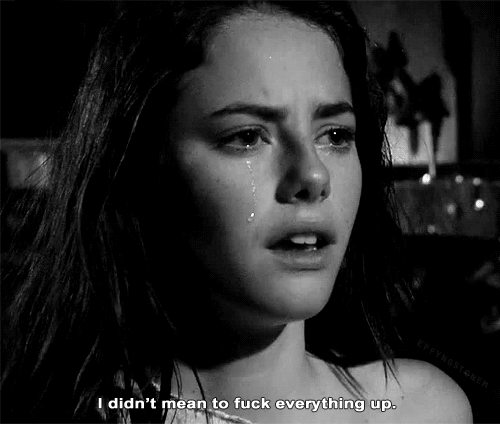
⚠️ Disclaimer: I am not saying these placements are inherently borderline or bipolar. But they may be more prone to borderline/bipolar behaviors. You can use astrology to observe your subconscious patterns. Essentially, you can use it for shadow work. But these may not apply to everyone so take what resonates and leave what does not.
I want to clarify that I am not demonizing, diagnosing, or generalizing mental health disorders. Astrology & psychology can intertwine with each other. You can use astrology for deeper introspection & pairing both psychology + astrology together can help with healing. But I am simply observing my understanding of specific psychological disorders & how they connect to astrology via shadow work. But you can use astrology to predict certain mental illnesses. But it’s still a prediction so it may resonate or it may not.
You can use astrology to predict pretty much anything though. It’s like forecasting but instead of predicting the weather you are predicting energy. But how I come to my observations/predictions relating to astrology/psychological disorders is by observing my struggles with mental health, plus, taking the knowledge I’ve learned about mental health disorders through college, reading psychology books, and just researching on my own time in general. But also, observing mental health disorders in others, and then connecting it back to having specific placements in a natal chart. That is my process. But I’m also intuitive/AuDHD as well. I feel energy and I include the energy I feel plus pattern recognition into my predictions as well. 🤍
Scorpio Sun/Moon/Rising/Venus/Mars/Saturn- when they feel emotionally slighted they can have a tendency to see things in only black & white. There is no gray area when it comes to how they perceive situations. Can be vengeful & petty when they feel a real or perceived betrayal.
Capricorn Moon- the moon is detriment here. It can be difficult for these individuals to connect to their emotions. They may even suppress them. But they can be emotionally explosive if pushed to that point. Everything they have been suppressing will come to light essentially.
Gemini Sun/Moon/Rising/Venus/Mars/Saturn emotionally unpredictable & chaotic af. They can be multiple different people at once feeling multiple different emotions & perceiving multiple different perspectives/realities. Their brain is always moving & rarely ever still.
Cancer Sun/Moon/Rising/Mars/Saturn can be emotionally explosive especially if unevolved or negatively aspected. They feel things intensely & can be all over the place emotionally. The moon cycles can impact their emotional state too.
Negatively Aspected or Unevolved 12H/8H Stellium/Sun/Moon/Mars/Venus/Saturn. These individuals may feel like they have an unstable sense of self. They can be emotionally volatile as well especially if they are not connected to their emotions yet.
Moon Square Venus- These individuals can struggle with codependency & will display behaviors like emotional suffocation & emotional neediness overall. May struggle with forming relationships with others because of this too.
Chiron Aspects- Chiron in astrology represents our deepest wounds. But essentially, if these wounds are unhealed or just unevovled in general, they can manifest negatively. Like emotional avoidance or emotional volatility.
Uranus Moon Aspects- can manifest as emotional independence. These individuals may find it difficult to ask for emotional support. Which may manifest itself as emotional detachment or mood swings.
Pisces Sun/Moon/Mars/Venus/Saturn or Neptune aspects- may struggle with being grounded in reality & are prone to more escapist behaviors. They can be emotionally self-destructive too. May be prone to addiction-like behaviors. Could have an addictive personality.
Water Dominant Charts: these individuals may be emotionally unpredictable & sensitive in general. They feel extremely deeply which can be intense for them especially if they haven’t learned how to control their emotions yet.
Aries Moon/Saturn: may be prone to emotionally explosive & emotionally impulsive behavior especially if unevovled or negatively aspected.
Empty 1H or Saturn in the 1H- may struggle with feeling like they have no sense of self & it may even feel like they lack one. Which makes it difficult for these individuals to develop & assert their personality overall especially true if they have no planets in the 1H.
~Part 2~
#astrology#zodiac signs#shadow work#bipolar disorder#bpd#bpd thoughts#bpd mood#healing journey#spirituality#astro placements#astrology observations#mental health matters#mental health awareness#mental illness#zodiac placements
435 notes
·
View notes
Text
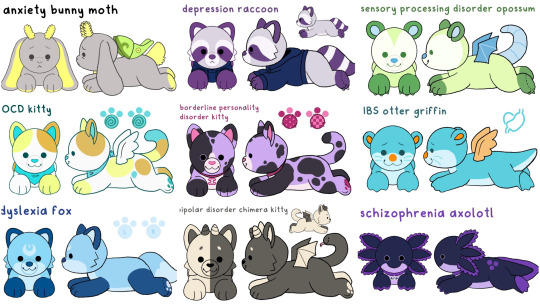
all nine of the stretch goal designs for this campaign - I am not sure how many goals we will be able to reach but there will come a point where I won't be able to do any more goals unless I get fulfillment help, so we'll see if it gets to that point and if I can get help! below the cut are the names, info, and artist statements for each plushie! I may end up changing the names as I am still not sure about ash, sandy, kelly, and luca, but let me know if you like them!
Tristan The Depression Raccoon: Tristan’s plushie will come with a removable hoodie accessory! He loves cozy video games like animal crossing and stardew valley. There are not many widely used symbols for depression that I could find, so I chose Tristan's colors based on how my depression makes me feel, bruised and cold.
Ash the Anxiety Bunny Moth: Ash’s plushie will have fluffy moth antennae and removable magnetic wings similar to Bug’s plush! They love to visit the home depot lights section when their friends are with them! I chose gray and yellow for the main body colors because my anxiety personally deals with uncertainty and things out of my control. The green comes from one of the anxiety flags created by Beyond MOGAI. To add moth features was a suggestion I got that I thought fit very well!!
Sandy the Obsessive Compulsive Disorder Kitty: Sandy is an artist and loves to draw and paint landscapes! Her wings will be attached via magnet, similar to Bug’s wings. The colors of her design are based on the OCD flag created by lucellion, with spirals in her paws to represent repetitive thought processes.
Melon the Sensory Processing Disorder Opossum: Melon is a silly opossum who has bat wings! Melon’s wings will be attached via magnet, similar to Bug’s wings. Melon’s colors are inspired by the SPD pride flag created by Beyond MOGAI.
Jazz the Borderline Personality Disorder Kitty: Jazz is a tortoiseshell kitty that loves to read!! Jazz’s plush will come with a pvc charm of the hand of Eris symbol for you to put on xer collar if you choose! The colors are loosely based on the BPD flag created with community input by ptsdsafe on tumblr.
Kelly the Schizospec Axolotl: kelly is an axolotl who is studying chemistry and loves science! kelly’s design is inspired by the Schizospec flag, created with community input and organized by schizosupport on tumblr. They will have a collar tag once again made of PVC featuring the associated double sided arrow symbol.
Em the Bipolar Disorder Chimera: Em is a chimera kitty who has dragon wings and a snake tail! One side of the snake tail is smiling, the other frowning. This takes inspiration from the :): symbol often associated with Bipolar disorder.
Cy the Irritable Bowel Syndrome Otter: Cy is a happy little otter griffin! They love to sculpt and craft and sew! Cy’s color pallet is based on the assortment of medications I take for my own IBS symptoms.
Luca the Dyslexia Fox: Luca is a dancer and loves to perform! Their design and colors are loosely based on the infinity heart+ moon and star symbol that is often found on dyslexia flags. they will have L and R embroidered on their paws, which was a suggestion I was given.
#tristan the depression racoon#audhd creatures#ash the anxiety moth bunny#sandy the ocd kitty#melon the spd opossum bat#Jazz the BPD kitty#kelly the schizospec axolotl#em the bipolar disorder chimera#cy the IBS otter griffin#luca the dyslexia fox#part of my concern with naming is that when it comes to a collection in order to make fulfillment easier on myself I like to choose names#that mostly have different letters to start. because. I will read the first letter of a name and then go off of that which has led to#many people getting sprinkles instead of scarlet or beau instead of beans ToT#so we have ash - bug - critter - cy (the one repeat) - dash - em - jazz - kelly - luca - melon - tristan#cy i think is different enough from critter because it is only two letters so if I confuse cy for critter. that's. well. i hope i won't
151 notes
·
View notes
Text
Now that I’ve finished reading Hortus de Escapismo and Executor’s record, I really gotta ramble about Executor for a second and kinda talk abt how Arknights handles his lack of empathy trait that I really enjoy. This isn’t a proper analysis or anything just my thoughts I wanna vomit for a sec.
So it’s implied in Executor’s record that he just, wasn’t born having empathy despite being a sankta. Or at least he just naturally doesn’t have the same levels of understanding of emotion as other sankta. The part that I really like about it is how Executor’s Record and story in general doesn’t portray that as a necessarily bad thing.
His lack of empathy allows him to think in a way that is a lot more unique than other sankta. When his partner in his record story told him to sacrifice him, he still brought his body back to Laterano. One of the reason being because of a specific sentence in the will they were enacting (“I hope all Laterans return back to their home.” Smth that most people would assume is just smth the will writer wrote for some extra literary flare) but also because he disregarded his partner’s feelings. His lack of empathy is the reason why he did something good and that is very interesting to me especially when most people tend to demonise having low/no empathy.
I also just really like how in his record story, it’s emphasised that he knows what emotions ARE. He has developed a system with his parents to recognise and visualise emotions by drawing lines that represent them. He knows what it is, he can recognise it to a level where he can think of the next best course of action when confronted with it, he just doesn’t put much importance on it nor does he bother with understanding it for the most part. Especially if it’s something that will get in the way of his job. And I REALLY like that cus it reminds me of how people irl that have low empathy will develop systems to work around it and still be kind.
I know a lot of us joke about Executor being autistic and that’s funny and I like the jokes as much as everyone else, but low or no empathy is a trait of other mental disorders and disabilities and even as someone that hasn’t been diagnosed with anything yet it still feels kinda nice to see low empathy being portrayed in a way that isn’t villanious.
In fact, Executor having low empathy kinda makes him the best person in the room sometimes especially in Hortus de Escapismo. The part where he does a warning shot at Oren and Lemuen and essentially goes “Can ya’ll STOP I’m trying to do my JOB.” And essentially manages to stop a massacre because of it is so funny but also so fucking hype bruv. I like how in the end of the event when Executor was starting to ask more questions and have more doubts and was starting to let emotions affect his actions a bit more, it isn’t framed as like “Oh mah gerd, he’s learning empathy and being more hooman!”
Instead he’s asking questions and seeking to find solutions to them in his own unique way. Asking around and adding more variables to his thought process like a computer would (which has some implications that gets my lore brain churning but hrghrghrgh)
Top it all of with the fact that he is specifically a character that is born and raised in a society that values empathy. Being able to feel other people’s emotions is what makes you a sankta. And Executor, is one of the better sanktas because he doesn’t follow that rule.
God I love Executor, go son, thrive.
258 notes
·
View notes
Text
Okay I’d like anyone that sees this to blind react and put a finger down for each thing in this list you relate to. There are 9 things. You can comment your score publicly or keep it private, up to you, but I think this might be interesting for some people. Here’s the list:
-Do you tend to take criticism too personally, or gotten unreasonably defensive when someone points out a mistake you made? Do you hate admitting you’ve done something wrong?
-Do you like to daydream about doing something amazing (such as saving people from a burning building, being the one to win your team the game, being an amazing actor in a movie, etc.) and having people recognize you for the great thing you did?
-Do you place in importance on being associated with important or high status things, like trying to date/be friends with the coolest kids in your classes, or choosing to go to a prestigious university over a common state school?
-Do you tell people about things you’ve done specifically to get praise for it? Such as telling your friends about the A you got on that really hard math test, or pointing out your cool new hairstyle, or the drawing you did that you think looks really cool, specifically so that they will compliment you for it?
-Do you feel comfortable prioritizing yourself and what you want/need over other people?
-Have you ever diminished your accomplishments, or been purposefully self-deprecating so that the person will reassure you (i.e. “You’re such a good artist!” “Oh no I’m really not, anyone could do what I do” “No really, your art is amazing!”)?
-Do you find it hard to genuinely care about other people’s problems?
-Do you get jealous easily if, let’s say at a party, your friend is getting more attention than you?
-Have you ever felt secretly happy that someone around you failed or did worse on something than you did? Like maybe you didn’t want your friend to fail their math test, but them failing it did you make you feel a little extra good and proud about the non-failing grade you got on it.
(Scroll for explanation for spoiler reasons)
So what that list was a rewriting of the DSM-5 diagnostic criteria for narcissistic personality disorder, where for each section I filled in one of the ways I actually feel that part of the criteria. So instead of “grandiose sense of self”, I said “bad at taking criticism”, because that’s one of the ways my grandiose sense of self actually presents. If this was the original diagnostic criteria, you would need 5 of 9 to be diagnosed with NPD.
The reason I asked you all to count how many you relate to is that I have seen a lot of egotypicals do this exact same stuff. My goal is to help someone possibly unfamiliar with NPD understand that people with NPD are not the foreign, subhuman monsters that we are so often represented as, but rather people who feel some normal human traits too much.
(Also please don’t use this alone to self-diagnose, it was not made for that)
(Also also, thank you to the people in the reblogs for letting me know I could’ve used the read more feature. I am new to tumblr so tips on how to use it are appreciated)
#actually cluster b#actually mentally ill#actually narcissistic#actually npd#anti npd#narcissism#narcissistic personality disorder#npd#pro npd#actually neurodivergent#mental illness#mental health#neurodivergent#neurodiversity#neurospicy#neurodiverse stuff#actually neurodiverse#neuropunk#cluster b#bpd#aspd#hpd#mentalheathawareness#npd info#npd posting#npd safe#npd stigma#personality disorder#narcissistic abuse
181 notes
·
View notes
Text
A Critique of Riordan's: Neurodivergency
tldr: Rick made ADHD and dyslexia superpowers in the books which fit the time he wrote the books, but it's not accepted now cause it diminishes neurodivergent struggle. At the same time he made autism coded characters the 'annoying' ones and had a very racist thing of having the only neurotypical be Frank.
He tried to fix it in the show. It worked for about 3 seconds.
TW: Ableism, Autism speaks mention, r slur, anti-schizo stuff.
This paragraph is useless so don't read if you don't want to: Sitting in my drafts are 3 different 'A critique of Riordan's' posts i made as i tried to redo my full critique of the Riordanverse with a little more positive feedback and a little less Rick Riordan is the devil spawn. I have decided to not do it in order because because i watched the show and i noticed some things which were iffy and others which were great. So yeah neurodivergency first. Enjoy and think Critically.
Books
Research and Diversity
The books were written in the early 2000s for Rick's son who has ADHD and dyslexia
As a result, it takes on a very "your ADHD and dyslexia is a superpower" message which were popular during the time, but we recognise now has delegitimised neurodivergent struggles
Also as a result, the books were very focused on his son's symptoms, and represented ADHD as a monolith which quickly turned into stereotypes (e.g jumpy, impatient and fast reflexes becoming the connecting feature of half-bloods)
It got so unresearched that at one point he said:

He also talks about coffee in a similar way, despite sugar and coffee not making us more hyperactive and instead making us sleepy. Unless all the scientists and people with ADHD are wrong i really don't know this works.
and also said this: "Leo was extremely ADHD even by demigod standards" Like what
But the worst part about the PJO books was that the neurodivergency was limited to the first book. Percy's ADHD and dyslexia magically vanish and honestly it's only really brought back up in HOO every now and then (not very well might i add)
Ways he could have improved:
He could have given other characters, like Annabeth, more diverse symptoms of ADHD. It wasn't that hard, For Annabeth recognise that she as a 'gifted kid' is more likely to have undiagnosed and so have to face the issues related to being undiagnosed and/or being both a gifted kid and having ADHD, and then also give her more symptoms common to girls like being really chatty or frequently daydreaming.
Continuing having ADHD (and dyslexia) as constant parts of the novels rather than throwaway lines. Build it into the characters actions and persona rather than add it on like an accessory
Research. Never stop researching. Always reach out to people with the disorders and ask them to help. Writing is nothing without research.
Get sensitivity readers
Grammar
This is really minor, but he keeps say ____ was ADHD, and like gramattically that's a no. I am not a disorder i am a person with a disorder . Note for autism, the prefered grammer is Autistic person (aka turn into adjective and describe, something we can't do with ADHD)
Nico and Leo
Making Leo and Nico the 2 characters who were annoying and unlikeable (to everyone else not to fans) was really weird cause these 2 characters were the autistic coded ones.
NOTE: I did see a post explaining it better in the past, and i will link it when/if i find it again.
Tyson and the R Slur
I genuinely think he tried to make the r-slur scene show that it was bad, but the way Percy reacted to it wasn't quite right. Especially for childrens books these things need to be really clear. So it was good to make a bad bully character who was hated say it, but he could have made it better by skipping Percy saying "He’s not r*tarded" and go straight to "I had to try really, really hard not to punch Sloan the face."
The scene was ok, it could have been better, but again these were written in the 2000s, we have to acknowledge that.
Percy and School
Now this is interesting because this is more recent. Percy tried really hard in school and was smart, it was part of his characterisation. But he never did well in school, because that's how his disability affected him (especially since it was the American school system which we all know is shit and even more shit for people with learning disabilities).
The problem stems from TSATS, where Percy is made out to skip school, and not try at all (feeds into people with ADHD do bad cause they don't try/are lazy)
credits to @aroaceleovaldez
Racism: Frank Zhang
Frank Zhang the only Asian member of the 7 has no form of neurodivergency, despite the rest of them all having. It must be a just coincidence that there's a stereotype that asians are really smart and good at maths and the fact that the rest of the Romans have dyscalculia/s.
It's not weird at all that the character instead has lactose intolerance, which is really common in East Asia unlike dyslexia, ADHD or dyscalculia, which has such a low rate of diagnosis because there is a large stigma behind the disorders and because white people don't think Asians can have learning disabilities/s. No not weird at all that the dude is described with symptoms of dyspraxia but Rick refuses to recognise he is not neurotypical/s
I'm stepping out of sarcasm speak to remind you that Asians with learning disabilities are significantly less likely to get diagnosed with anything because:
because their parents won't let them until they have no other choice (glares at my parents) because there's a massive stigma behind intellectual/learning/development disorders in these communities
When we do try to get diagnosed our claims are diminished because of racist stereotypes and the belief that booksmarts/giftedness = no learning disability. It means most psychologists and psychiatrists (who are usually white) think that all Asians are smart so they don't ever have any form of neurodivergency and we're left to struggle.
Schizo Rep
Octavian. Villain. Schizo. Again.
Do i even need to explain this?
Show
Not actually a specific disorder - Percy just has a learning disability
Interestly Percy's dyslexia is just never talked about, And even his ADHD is never mentioned by name. He's got a random learning disorder which isn't specified. At first i assumed it was still ADHD cause the books, but watching more, you realise they aren't actually focusing on what learning disorder he has and what he has to deal with as a result of that. It's just a generic learning disorder.
Which is weird because learning disorders are all different and we all face different things, even with the same disorder. So placing all learning disorders in the same group? not good. Don't know what i expected from disney, but it wasn't this.
Autism Speaks
So the show tried to acknowledge that Percy was constantly told he was special and heroic when he really wanted to have help for his issues and for people to recognise that he has problems and those are bad. It also represented less stereotypical adhd symptoms (though whether that's because the disorder is no longer adhd or whether they wanted more inattentive symptoms to be present, we'll never know)
but then it went ahead and used a broken puzzle metaphor for his neurodivergency?

Puzzle piece metaphors when talking about any form of neurodivergency are a no go because the creators of the metaphor literally want Autistic people dead.
I DON'T GIVE A SHIT THAT HE DOESN'T HAVE AUTISM, WE ARE NOT ALLIES TO THE AUTISM COMMUNITY IF WE USE THE LANGUAGE AUTISM SPEAKS CREATED
Not only that but a broken puzzle is not a good way to represent us anyways because NEURODIVERGENTS AREN'T BROKEN.
#rr crit#percy jackon and the olympians#percy jackson#percy jackson and the olympians#my post#rick riordan#anti rr#rrverse#pjo fandom#pjo hoo toa#A critique of Riordan's#rick riordan critical#dyslexia#anti rick riordan#annabeth chase#hoo#heroes of olympus#tw: autism speaks mention#leo valdez#piper mclean#hazel levesque#reyna avila ramirez arellano#frank zhang#heros of olympus#pjo#riordanverse#pjo tv show#pjo series#adhd#neurodivergent
190 notes
·
View notes
Note
hey! I recently realized that one of my stories has a serious lack of physically disabled characters (one secondary character has a facial difference) and I'd love advice on what physical differences and disabilities are in more intense need of representation. I know one of my characters is going to be missing a limb, but idk whether they should be an amputee or just born that way, and what limb/ where it should be missing/if it should be underdeveloped or just totally gone. I want to know what type of limb differences are most underrepresented so I can do some research and see if I could feasibly add it to my character. I'd also like to hear some other general physical disorders and disabilities that need more rep (all physical differences need more rep but yk what I mean)
Most if not all of my characters are autistic/adhd or both, although it isn't mentioned (they're just like that because I as a person can't write neurotypical people)
Hello!
As mod Rot has said before, every disability is currently underrepresented (and those that seem represented are often, well, not getting the best rep to say the least). With that said, I do know what you mean, and there are some that are less represented than others.
For a missing limb specifically it might seem like it's "overrepresented", but in reality there's a ton of limb differences that I have absolutely never seen represented in any way, shape, or form. There's simply way more options than creatives ever consider.
The most common cause of acquired amputation is actually not represented much at all - diabetes. Almost all amputations in media are traumatic, but that's not necessarily how it is.
In most cases, the smaller the amputation the more common it is. A lot of characters in media have a shoulder amputation (with a prosthetic, of course), but that's probably the rarest possible one in real life. It's also worth mentioning that the fewer joints you have, the harder it is to use a prosthetic. A knee can change everything.
If they're missing a leg, consider giving them a mobility aid - connecting to the previous point, the higher someone's amputation is the higher the chance they will use them over a prosthetic, but anyone can use them.
Or, they can use both a prosthetic and a wheelchair/crutches at different times. Or they can use prosthetics with mobility aids, like a cane, crutches, or a rollator to help with balance!
Losing a leg is also incredibly more common than an arm, but in media it's the other way around for some reason.
Congenital limb difference of the not-full-amputation variety isn't seen much either, and it has more types than I could possibly list here, but I'll try; phocomelia, symbrachydactyly, micromelia, radial aplasia, ectrodactyly, tetraamelia, polysyndactyly... The only character that I know of with any of these has been made by my friend. Certainly not a popular thing to represent.
To go with the above, think about syndromes that cause limb differences! Some examples could be Ellis–Van Creveld syndrome, Otopalatodigital syndrome spectrum disorders, Pfeiffer syndrome, Joubert syndrome, or the VACTERL association. Or a thousand other things!
Limb loss due to cancer is also a thing! It also relates to a very specific kind of amputation, called rotationplasty, and it's when a person has their knee replaced with their ankle, and their foot is well, rotated. That's how important having a joint is.
Also I know that you said limb and not limbs, but remember that multiple amputations are a thing as well! For example bilateral above knee (often called BAKA), or quadruple amputation are greatly underrepresented :-)
As for non-limb loss underrepresented physical disability ideas, well, all of them, but just for the sake of some new ideas I will try to list ones that AFAIK haven't even been mentioned on the blog at all before (at least as of writing this).
CHARGE syndrome
Hyperthyroidism
Hypohidrotic ectodermal dysplasia
Hereditary trochlear nerve palsy
Harlequin-type Ichthyosis
Locked-in syndrome
Chronic obstructive pulmonary disease
Primordial dwarfism
Addison's disease
Duchenne muscular dystrophy
Apert syndrome
Charcot Marie Tooth disease
Usher syndrome
Nager syndrome (also, causes limb differences)
Peripheral Artery Disease
[links lead to very basic information pages]
These are just some ideas for disabilities that are 1) physical and 2) very underrepresented, some visible, some not - I hope it gives you some ideas for what to research for your character(s)! I tried to list both very common and rare ones :-)
You can also take a look at our #disabled character ideas tag, or posts like this (there's a lot of facial differences listed, mostly at the end) :-)
I hope this helps!
mod Sasza
149 notes
·
View notes
Text
Apparently some people over on the hellsite formerly known as Twitter have described Ed as a psychopath. Many people have pointed out the racism inherent in this take - and while I wholeheartedly agree with that, I would like to focus here on what psychopathy actually is, and why it is absurd to apply that label to the character we see on our screens in OFMD.
To preface this, I am a research psychologist by training and have done some work on psychopathy. I am by no means an expert, though, so any corrections to how I have represented psychopathy here are welcome. This will be quite a long post, so I'm putting the rest under the cut.
OK, so what is psychopathy? The truth is, it has a very messy status. It does not appear in the DSM-5, which is the diagnostic manual for psychological disorders. Someone with psychopathic traits would likely be diagnosed with antisocial personality disorder (ASPD). But psychopathy as a construct is widely used in the scientific literature - especially clinical and forensic psychology - and it is used to describe a specific type of personality that overlaps with, but is distinct from, ASPD.
At the core of psychopathy is a lack of empathy and remorse; psychopaths see others not as fully realised people with rich inner lives, but as instruments to be used in pursuit of their own goals. Violent behaviour is not necessary or sufficient to be a psychopath but many psychopaths will use violence as a tool to further their own agenda, and they will not feel bad about it.
While 'diagnosing' fictional characters is a folly, in this case I think there is clear canonical evidence that Ed is not a psychopath.
Ed does not lack empathy. He empathises with Stede immediately - the very first thing he does when Stede wakes up is to reassure him that his crew is OK.
And there are numerous, non-Stede examples too. We see Ed empathise with the crew following the fuckery, with CJ when he lies about being mutinied, with Fang when they go fishing together...
Does Ed lack remorse? Very clearly not. His remorse over killing his father is absolutely fundamental to his character. And that remorse has led him to build up walls around the violence he has perpetrated and ordered as Blackbeard ("I didn't kill those guys, the fire did").
Ed's behaviour towards Lucius and the crew from 1.10 through to 2.2 could be construed as using violence instrumentally to achieve one's own goals. But the narrative makes it pretty clear that this behaviour is attributable to an acute mental health crisis - not to an innate personality type. And crucially, he feels remorse about this behaviour. He tries to make amends. He tries to do better.
Finally, Ed's entire arc of wanting to leave piracy behind would be very difficult to reconcile with him being a psychopath. He is unwavering in this desire from the moment we properly meet him - so much so that he is willing to leave behind the only person he has ever loved.
In summary, Ed is empathetic, he is plagued by the violence he has committed, and he wants to be a better man. These traits are wildly inconsistent with a psychopath.
So, er.... thanks for coming to my TED talk, I guess?
133 notes
·
View notes